United Nations
The UN Water Conference is back for the first time in 50 years, organized by the UN General Assembly and co-hosted by the Governments of Tajikistan and the Kingdom of the Netherlands. The event’s revival highlights the increasing necessity for action on water and water-related goals. It will focus on the sustainable development and integrated management of water resources for the achievement of social, economic and environmental objectives, the implementation and promotion of related programs and projects, as well as on the furtherance of cooperation and partnerships at all levels.
“The UN 2023 Water Conference in March must result in a bold Water Action Agenda that gives our world’s lifeblood the commitment it deserves.”
Antonio Guterres, UN Secretary-General.
The conference will include an opening and closing session, six plenary sessions, and five interactive dialogues, as well as side events organized by participants. It will result in a summary of proceedings from the UNGA President that will feed into the 2023 session of the UN High-level Political Forum on Sustainable Development (HLPF). The event promises to bring together stakeholders from Governments, IFIs, NGOs, civil society, and more, working together to forge out a path to water security.
Ruth Richardson will organize a side event on behalf of INLW called “Reflections on Women, Water, Culture and Education Past, Present and Future” and Columbia University in New York is the main sponsor of the side event.
She is also been invited to speak at the side event, theme “Charting A Feminist Pathway to Inclusive and Productive Water Use and Governance” hosted by IWMI ( The International Water Management Institute (IWMI), Thursday 23rd of March from 10.00 am to 12.30 am at 62 Orchard St. 2 Floor, Manhattan, NY 10002 and will also be broadcast through an online Zoom link. She will be speaking at the side event titled “Innovative Solutions for a Sustainable Blue Economy through Water Action, Cooperation and Youth Engagement inside the UN Headquarters” on Friday 24th of March, from 12.30 to 13.45 PM, Conference room A.
Reflections on Women, Water, Culture and Education – Past, Present and Future

Wednesday 22 March 1:30 PM to 2:45 PM | Columbia University, New York, NY 10027
(the campus is easy to access by public transit using the IRT #1 subway to 116 Street)
The location of the program is the Center for Buildings, Infrastructure and Public Space at the School of Engineering, 500 West 120th Street, New York, NY 10027 (room 706).
Organizer:
INLW
Partners:
UNESCO Chair Water Ports and Historic Cities • IHE Delft Institute for Water Education • Dutch Water Authority Rijnland • Drinkable Rivers • United Nations Economic Commission for Europe UNECE • Womenvai • World Federation of Engineers Organisation WFEO • Erasmus University Rotterdam.
Program:
This Side Event will elaborate on the following issues. On the one hand Women Leaders are needed at all levels of society, in water utilities, government water agencies, and international and regional water institutions to reduce the democratic gender deficit in water leadership. On the other hand safe water and sanitation is so important for getting girls and boys to school and educated them to become water leaders.

SAVE THE DATE
Wednesday 22 March 1:30 PM – 2:45 PM
Columbia University, New York City
the campus is easy to access by public transit using the IRT #1 subway to 116 Street.
Theme:
“Reflections on Women, Water, Culture and Education Past, Present and Future”
Program:
This Side Event will elaborate on the following issues. On the one hand Women Leaders are needed at all levels of society, in water utilities, government water agencies, and international and regional water institutions to reduce the democratic gender deficit in water leadership. On the other hand safe water and sanitation is so important for getting girls to school and educated for them to become leaders.
Organizer:
INLW
Partners:
UNESCO Chair Water Ports and Historic Cities; • IHE Delft Institute for Water Education; Dutch Water Authority Rijnland; Drinkable Rivers • United Nations Economic Commission for Europe UNECE; • Womenvai; • World Federation of Engineers Organisation WFEO.
For more information about the side event on Wednesday 22nd of March 1:30 PM – 2:45 PM, at Columbia University, please contact Ruth Richardson, Secretary-General INLW at this email address: ruthy27@hotmail.com
This year the UN CSW was set with the title “Social protection systems, access to public services and sustainable infrastructure for gender equality and the empowerment of women and girls”
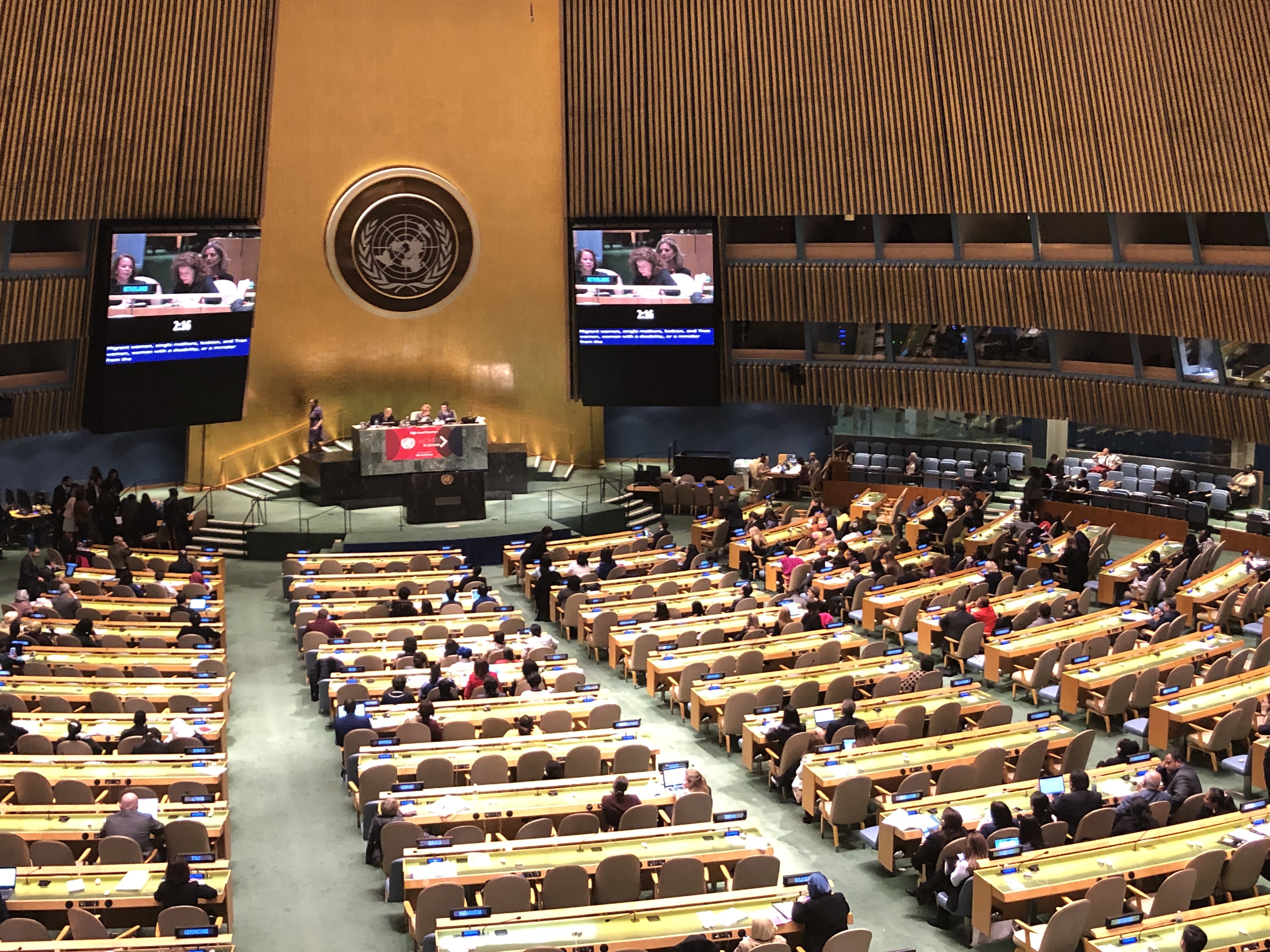
Several members of our INLW board were present. Our new president Jayanthi Balaguri, Margaret de Vos, Lysbeth van Valkenburg, Khadija El Morabit, Maysing Yang and Ruth Richardson were present during the opening ceremony, as well as Joaquima Alemany. Many persons from African and Asian countries were again not able to get visa’s to enter USA, like Awa Gueye our newly co-opted Vice President from Senagal for Sub Sahara Africa who had worked hard to get a big INLW delegation from Senegal and Mali to visit the CSW, but she herself received her visum just after the end of CSW! You wonder if the UN should stay in New York if people from around the world are not able to visit the UN because of US visum problems! We were able to welcome some new members though during CSW.
The opening started with a moment of silence for the lives lost in the tragic plane crash in Ethiopia.
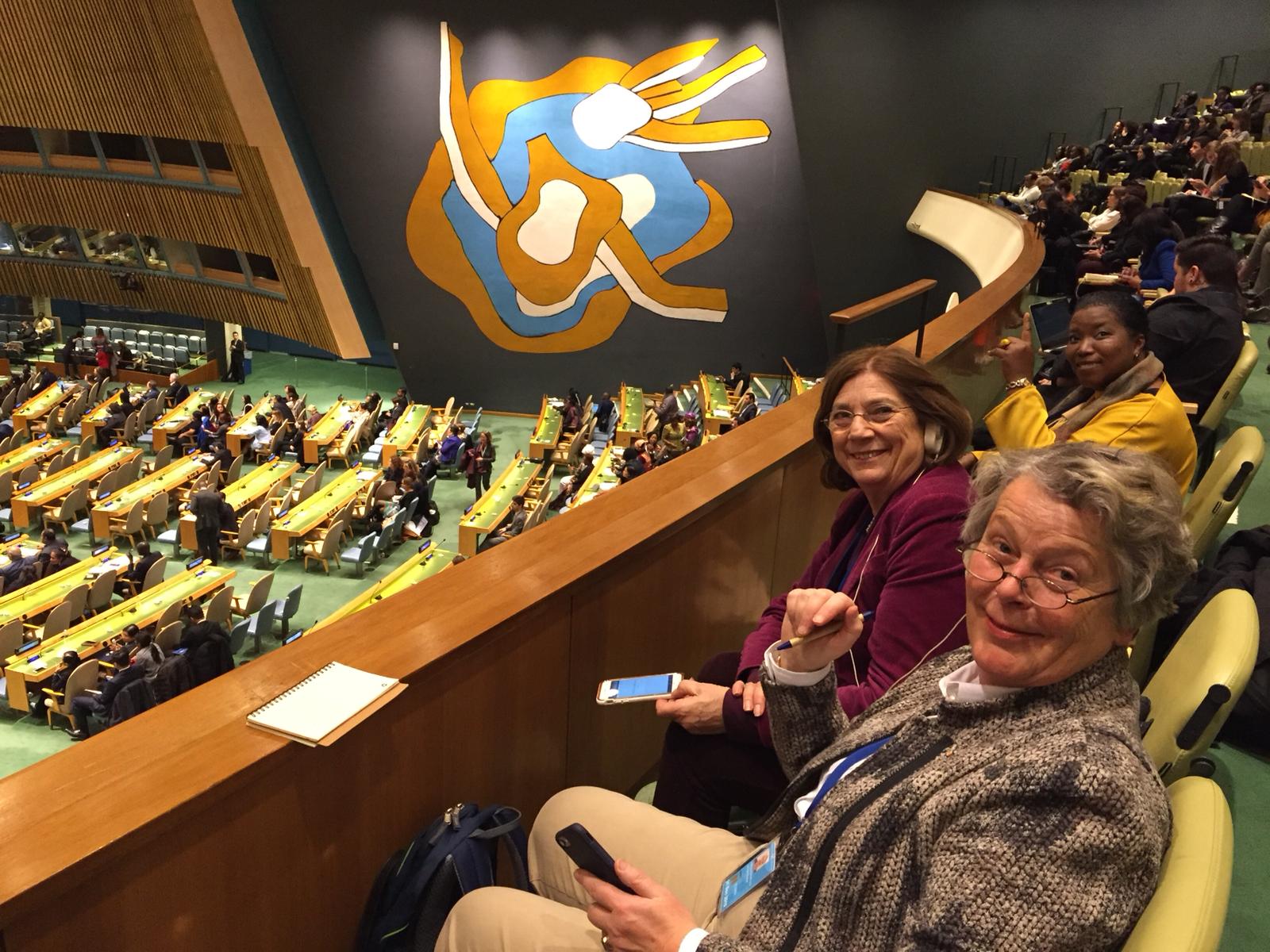
Ambassador Geraldine Byrne Nason (from Ireland) CSW63 Chair, gave us some good statements on the theme. “Changing laws goes hand in hand with changing gender norms, we are all responsible for women’s empowerment, and all responsible for making our societies more equal: to create positive change and share policies.
Increasing the financial capability of girls as well as awareness of their rights, helps them take advantage of economic opportunities. Over 100k girls will receive financial educations through life skills programs.
Women are leading the way in efforts to build resilience and adapt to the impact of climate change. They pick up the pieces when families are forcibly displaced or struggle to recover from conflict”.
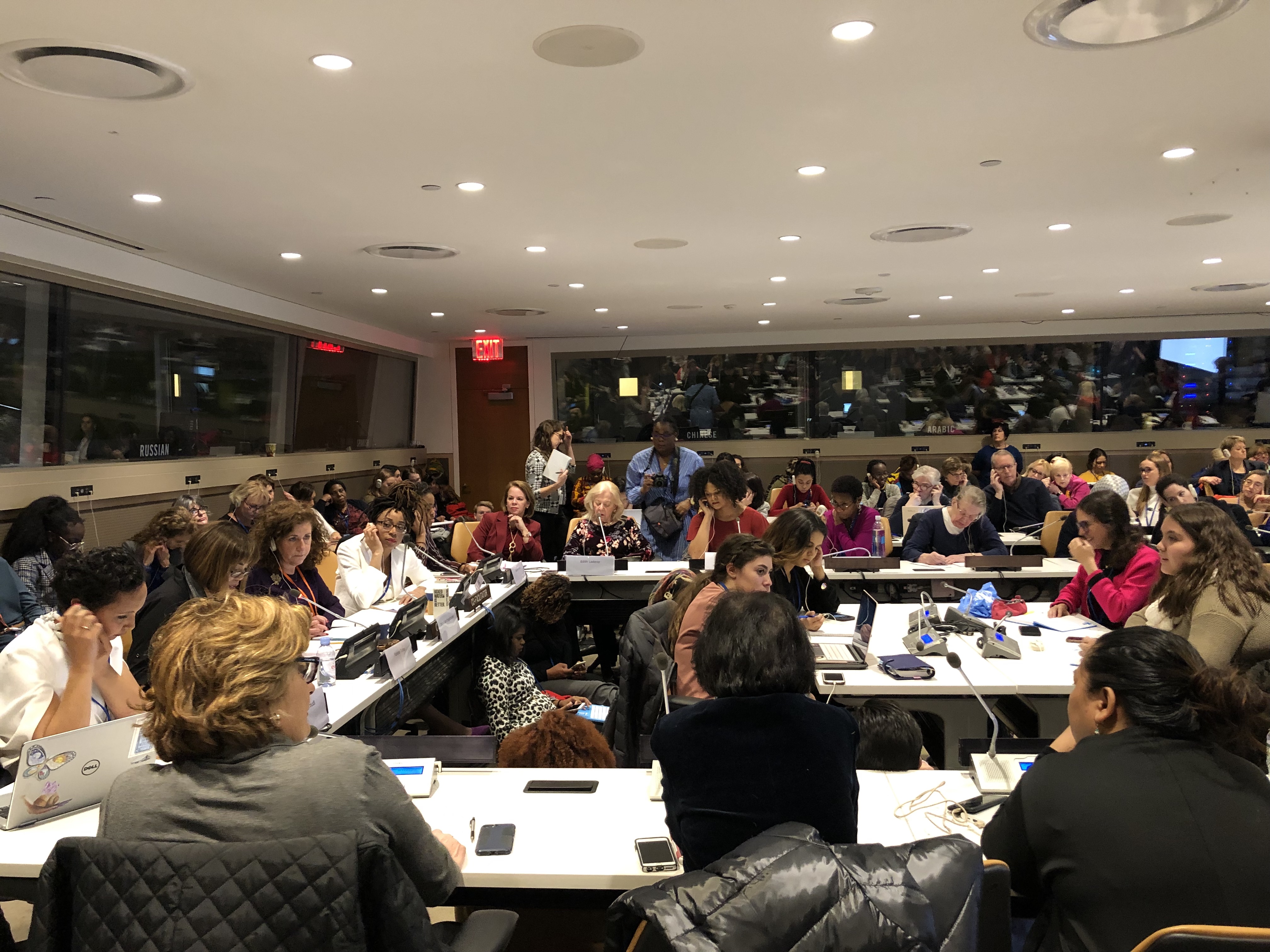
“Without a good basic structure woman won’t get any good position and rights. Laws, education, health and transport are important. In India we can see the result with more education there are more women in higher positions”. As Mrs. Nason stated in her opening of the 63rd CSW.
After the general opening all the various workshops and parallel events started.
The Monday morning session organised by Liberal International and INLW took place even before the official opening and had the title:
“Gov Ids My number, So Track Me Maybe?”,
do technology-based systems prevent long-term risk to democratic integrity? Discussion on the social protection implications of introducing digital IDS for the empowerment of women.
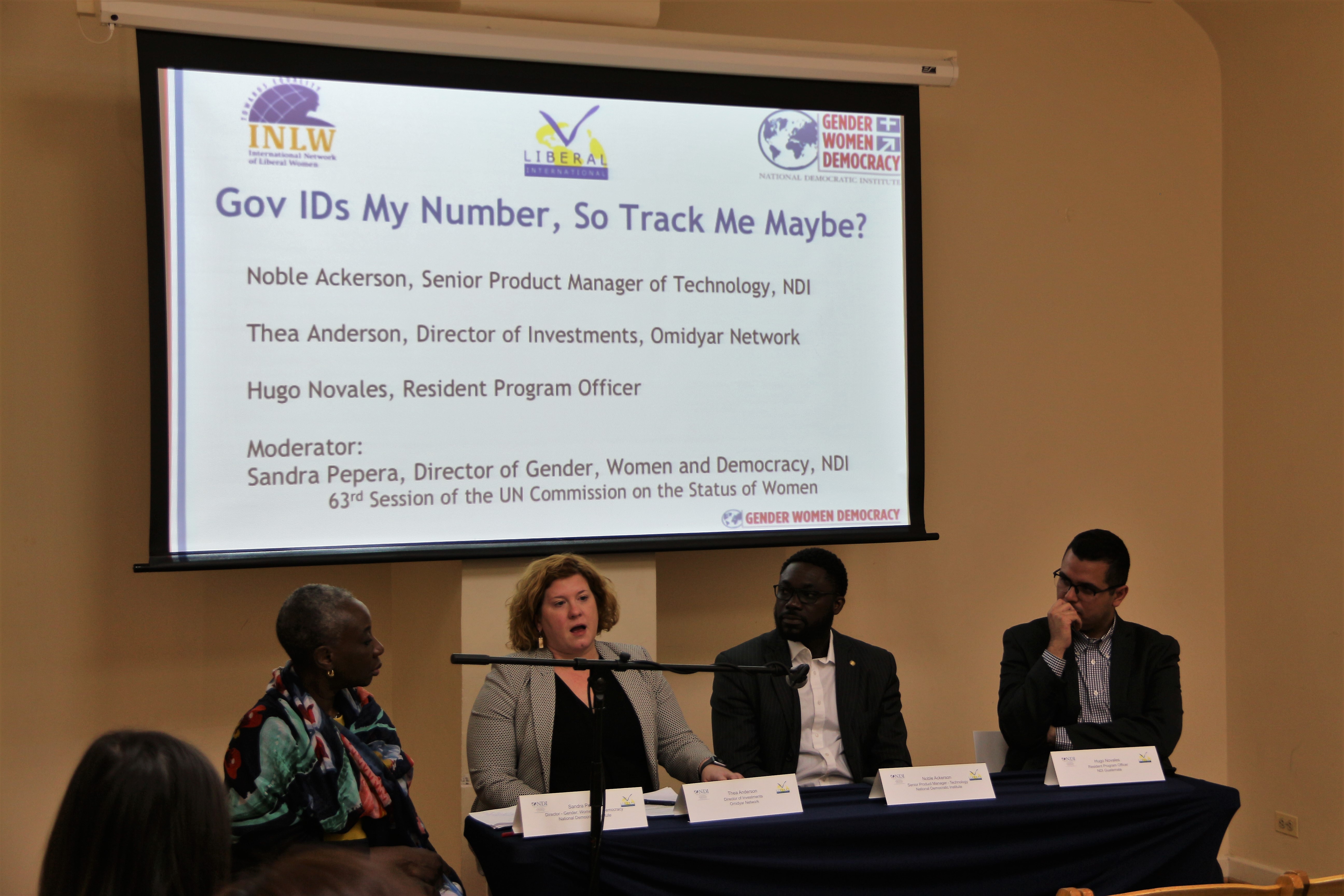
Sandra Pepera, director for Gender, Women and Democracy, NDI, was moderator during the session. Participants: Noble Ackerson, senior product manager, Technology, Thea Anderson, director , Omidyar Network and Hugo Novales, regional Program officer, NDI. They gave their different views on technological development for women and girls.
Digitization can do a lot for mankind as was concluded. Before we all became digital over a billion people had no access to a passport or ID. The poorer they were the more rare the opportunities of getting any ID. If you are without an ID how can you get money or a house for instance. It also implies that you are unable to get security or health care. At the moment 55% of the world population has no digital ID.
This is one of the most important issues for any government to organize as soon as possible.75% of our health care is linked to our ID, 11% has direct digital voting capacity. Digital ID gives efficiency but also many possibilities.
In Pakistan in 2009 14 million women had a digital ID to health care, at the elections 11 million were absent during the voting for parliament. Possibly because they were afraid to vote.
75% of our health care is linked to our ID, 11% has direct digital voting capacity. Digital ID gives efficiency but also many possibilities.
In Pakistan in 2009 14 million women had a digital ID to health care, at the elections 11 million were absent during the voting for parliament. Possibly because they were afraid to vote.
Thea Anderson concludes that it is quite a step to a digital world which also has to include privacy, choice and security. At the moment 148 countries are working with a digital system.
Noble Ackerson, from analogy to digital gives control, privacy and security as advantages. But governements often want to know a lot of data and are not prepared to give people insight in all they know. So we all have to be alert what we want to share, make our own choice.
Hugo Novales, with an ID you can show that you exist. It is not how to use data but also what is a government doing with the data when digitizing. Also who is the owner of the data? Where are our data stored?
Why do we want an ID? It is linked to social payment, so it is useful for our finances and important for education, but for any digital use you need electricity.
Regulation of data is important, there is a enormous amount of big data today.
In some countries, If you want to vote you have to register:
2007 43 million women went to vote
2011 50.9 women went to vote
2015 53 women went to vote because they were able to register because they possessed an ID.
In many countries banks are owned by the government so one must be alert to share ones ID and protect ones privacy, one must train people on all the risks.
Laws must be made to make it safer: data protection laws. Special laws have to be made for Google. Before you are using data, you always have to ask the owner. Digitalisation is a tool, but governments must be trustworthy. How long to retain information and at what cost. We must be careful and know what we are doing with our ID and data!
The panel gave us an interesting insight of all challenges and risks that are part of this new digital world.
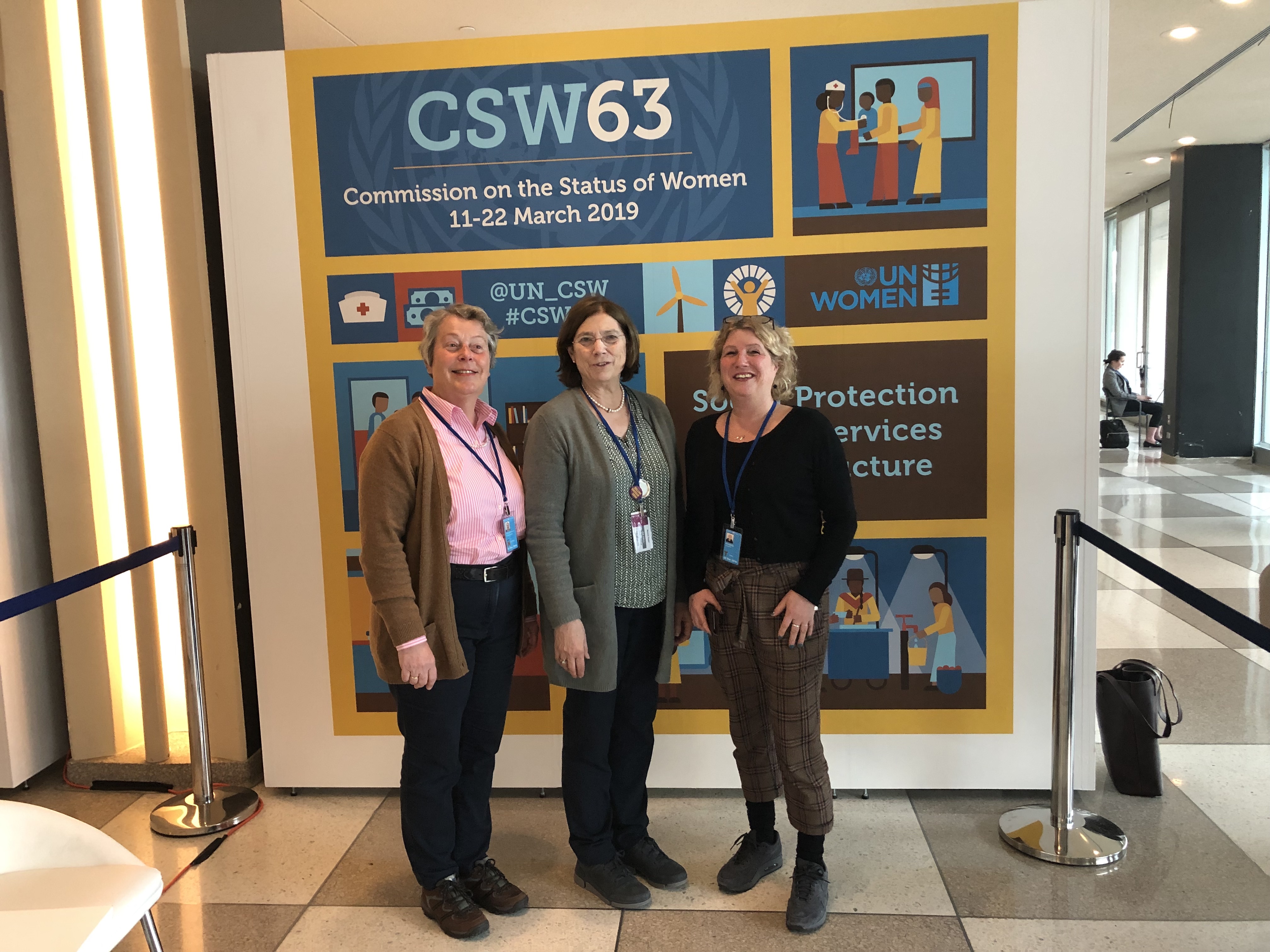
Another interesting panel discussion was about “Women in Media”.
Media informs, influences and shapes the world we live in. Journalism exists to serve the public and represent society. But unfortunately, women and minorities remain largely underrepresented. Both in front of the camera as well as in positions of power.
We see that in most media the men are the experts that are asked to give information.
Women have to make connections to form a network and thus become more involved. To show themselves on tv and other media.
But also in governments some countries show very few women in the decision making positions.
The start is in education; schoolbooks have to be updated with more examples of women in photo’s showing them at work and showing their achievements.
Women have to protest to committees or penal judges where there are only men holding the seats. They have to speak out to get more diversity.
We need more men to help us to get this done. Many choices are made by white men, they need convincing that any committee needs diversity to deliver good work.
In some parts of the world, safety is also a cause for women not to participate in official positions.
In the new digital world girls and women are facing harassment, so also in this medium safe spaces on-line are important.
Many choices for positions in government or other important places are made by people who tend to choose persons who resemble themselves and thus limiting possibilities for more diversity.
One speaker, a reporter working for one of the international bureau’s, was the first woman reporter sent to war zones in 1972. As she did this very well she was sent to other war areas such as Afghanistan, Northern-Ireland, Ruwanda, Bosnia and Israel. Her career is an example for the progress that has been made. But in media and boardrooms men are still uppermost present: there is a world to win for girls to make their mark in these positions.
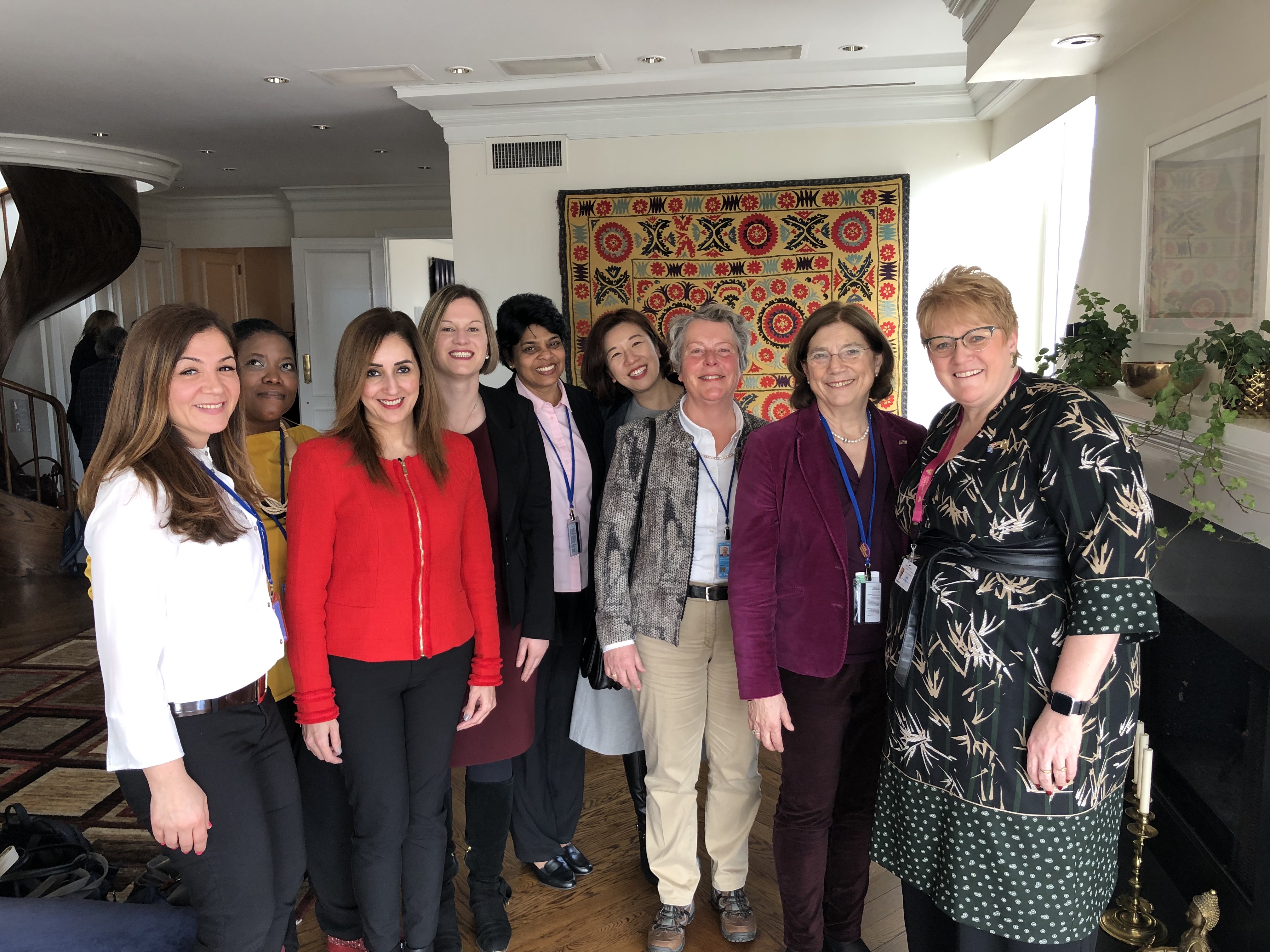
During the first week we also paid a visit to Minister Trine Skei Grande, Minister of Culture & Gender equality, Venstre Norway. She told us about the progress that has been made for the position of women in Norway. Wealth is especially increased because women are working.
In the political parties there are 4 women party leaders.
Maysing Yang told us about the difficulties in Taiwan, the law has to be changed first for women to get more possibilities such as ownership of their own business.
Khadija el Morabit could tell us that in Morocco on paper things are equal but in reality there are many problems for women and girls to get into important positions.
Jayanthi Balaguru, president of INLW, gave as a view about the problem in her country Malaysia where the enormous difference of culture and religion makes it difficult to reach any equality. But with support from all over the world the balance will be reached.
Minister Skei Grande told us that in Norway women’s rights were an issue but it is improving. The best way to get result is in education, but also health issues such as safe abortion are vital for progress.
At the moment there is a discussion about maternity leave. The government wants to divide it between men and women, so 1/3 for the women, 1/3 for the man and 1/3 they can devide themselves.
This gave huge problems with the women who are not really
prepared to share or give such a privilige to the man. So even in Norway there
is still a world to win.
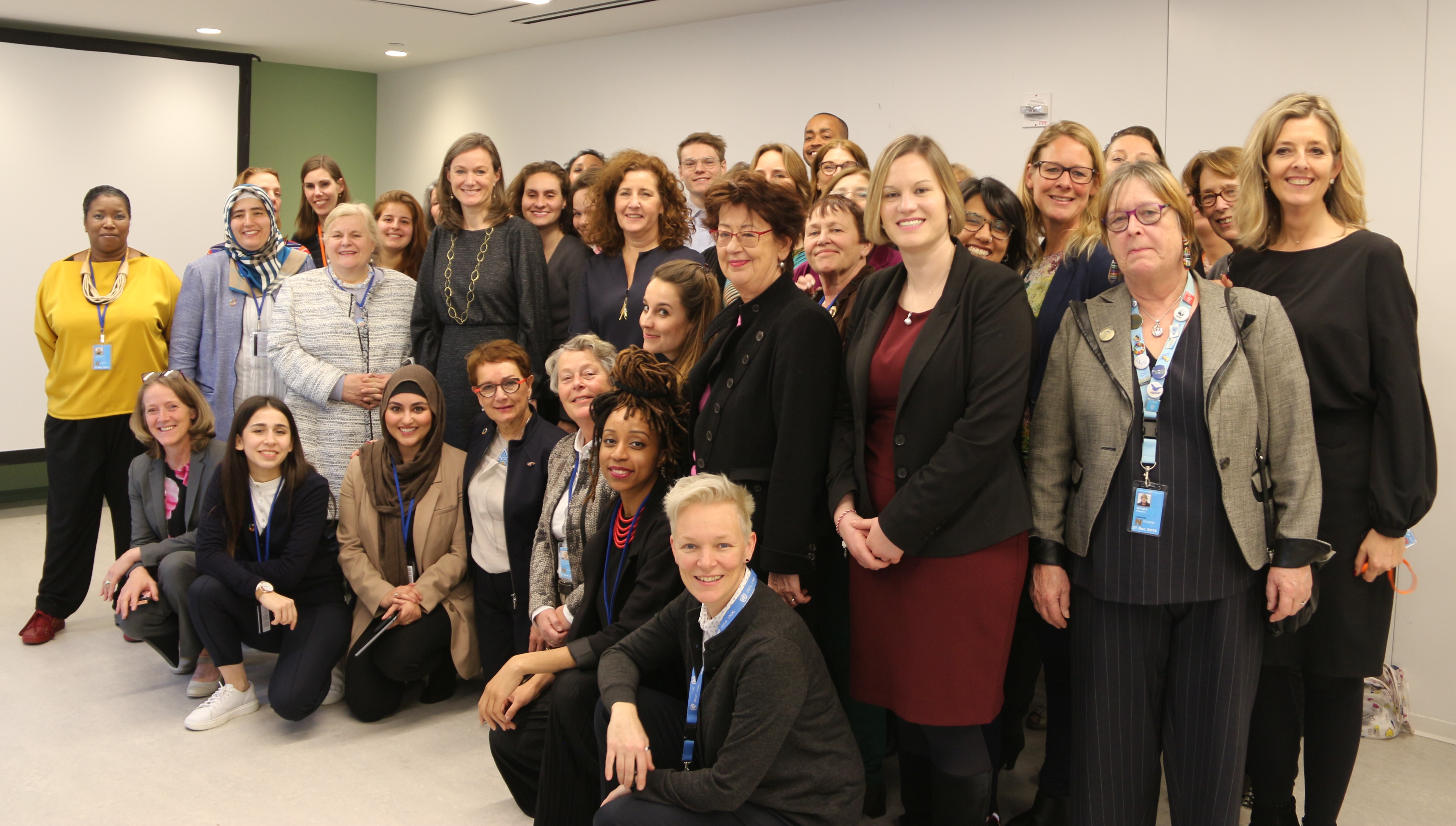
We also had a meeting with a large group of Dutch representatives including the Dutch minister of gender equality Ingrid van Engelshoven, she also gave a speech in the GA on behalf of the Kingdom of the Netherlands.
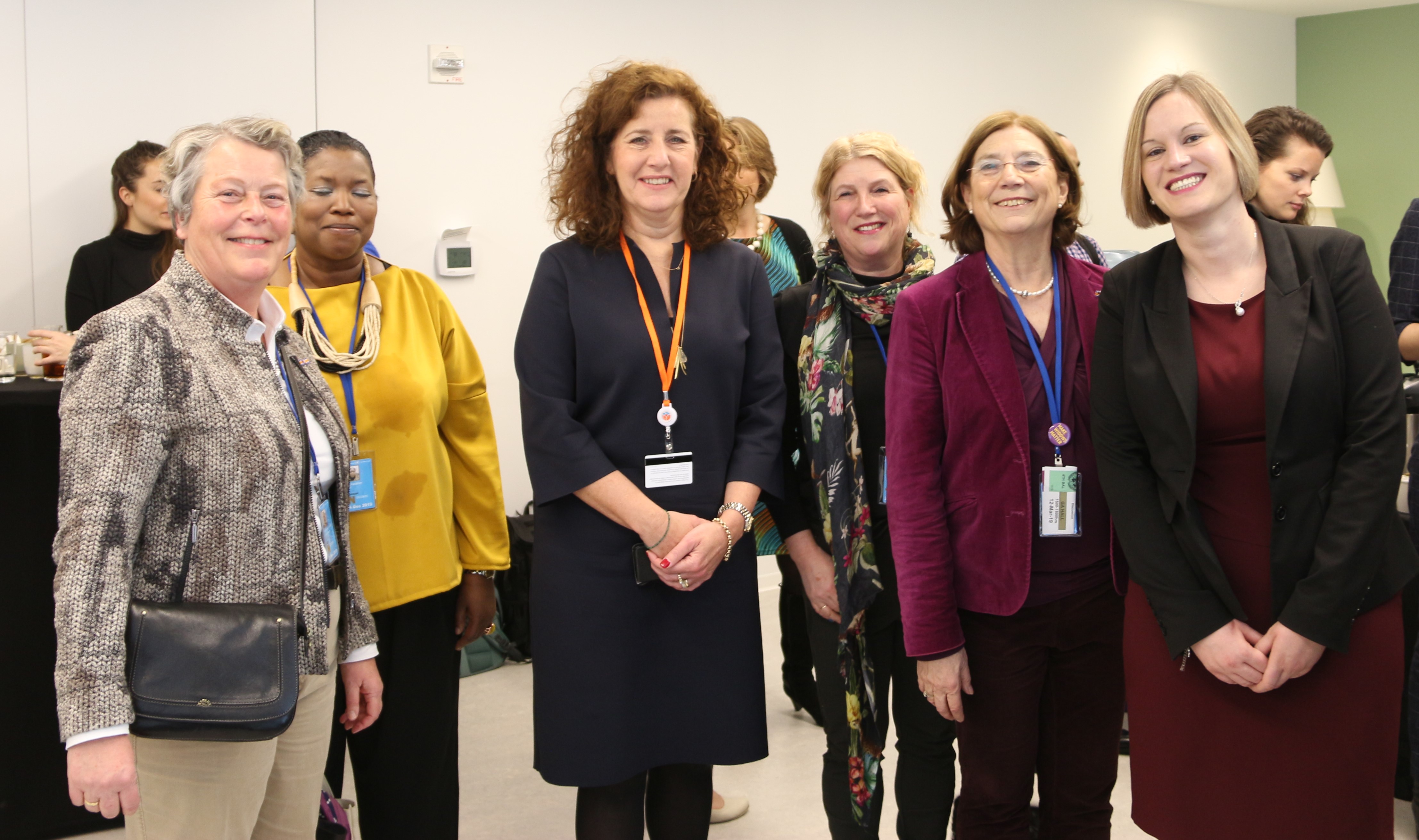
Another interesting event was about technology and education. Mrs. E.Focke-Bakker (Delft University) was one of the participators. She told us again what an enormous progress tech has given, but safety and security is essential for this development.
In universities we can see that students are easily connected and the young of today don’t always realise the importance of protection systems. They can study world wide with the MOOC’s (Massive open online courses) but good infrastructure for tech and affordable ICT is essential.

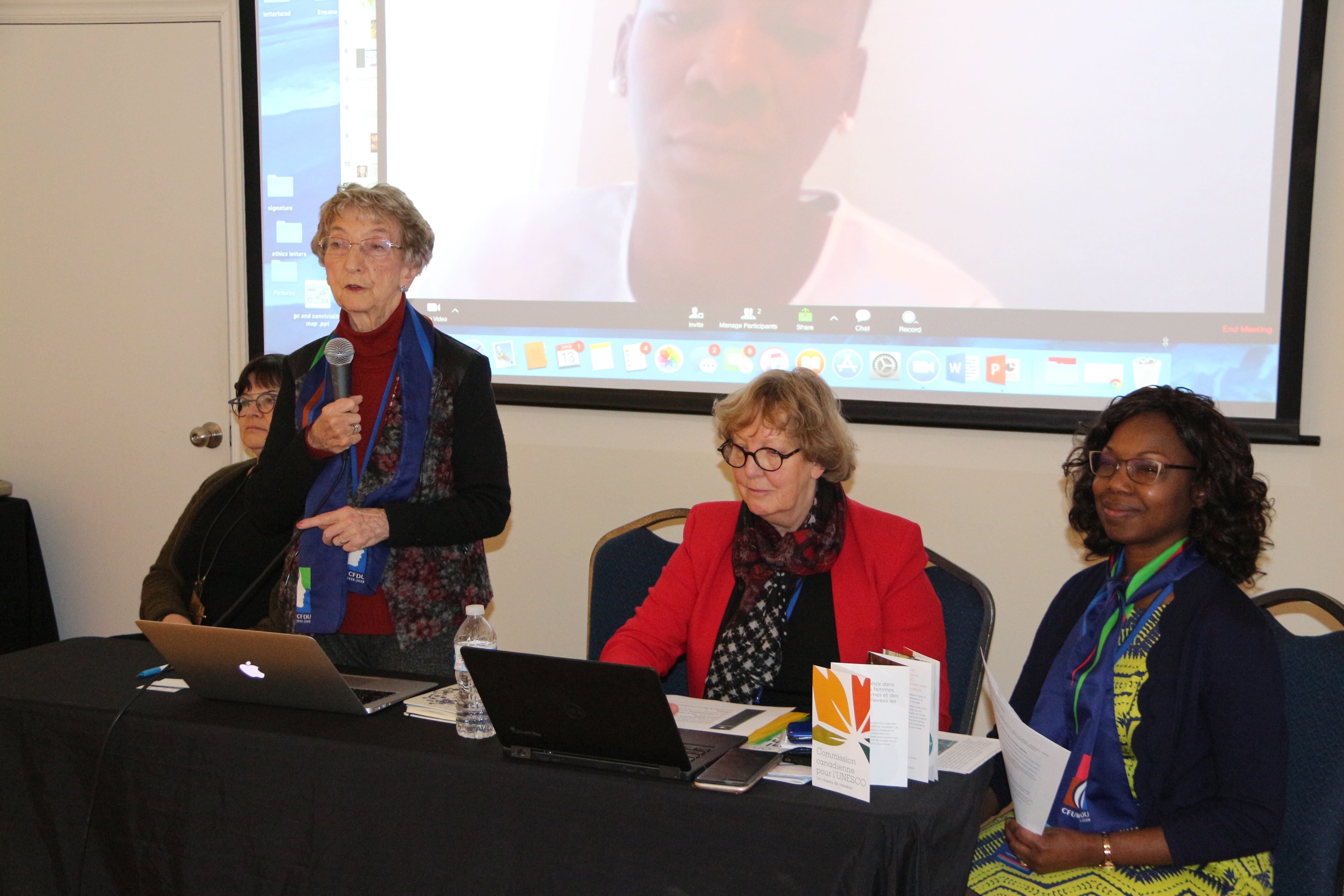
We must not forget that there are also people staying behind in this fast developing tech world. They need our special care. In the poorer countries the possibilities are enormous because of the tech development in education giving possibilities in their lives beyond school and they can study at home for their careers. Radio is also helpful if you can’t read or write.
Unfortunately we see cyberbullying and haressment, hate speeches and ID fraud as the new problems of the tech development. So there is a dark side to all the advantages.
Governments have to be aware and introduce new laws to protect users of the new ICT.
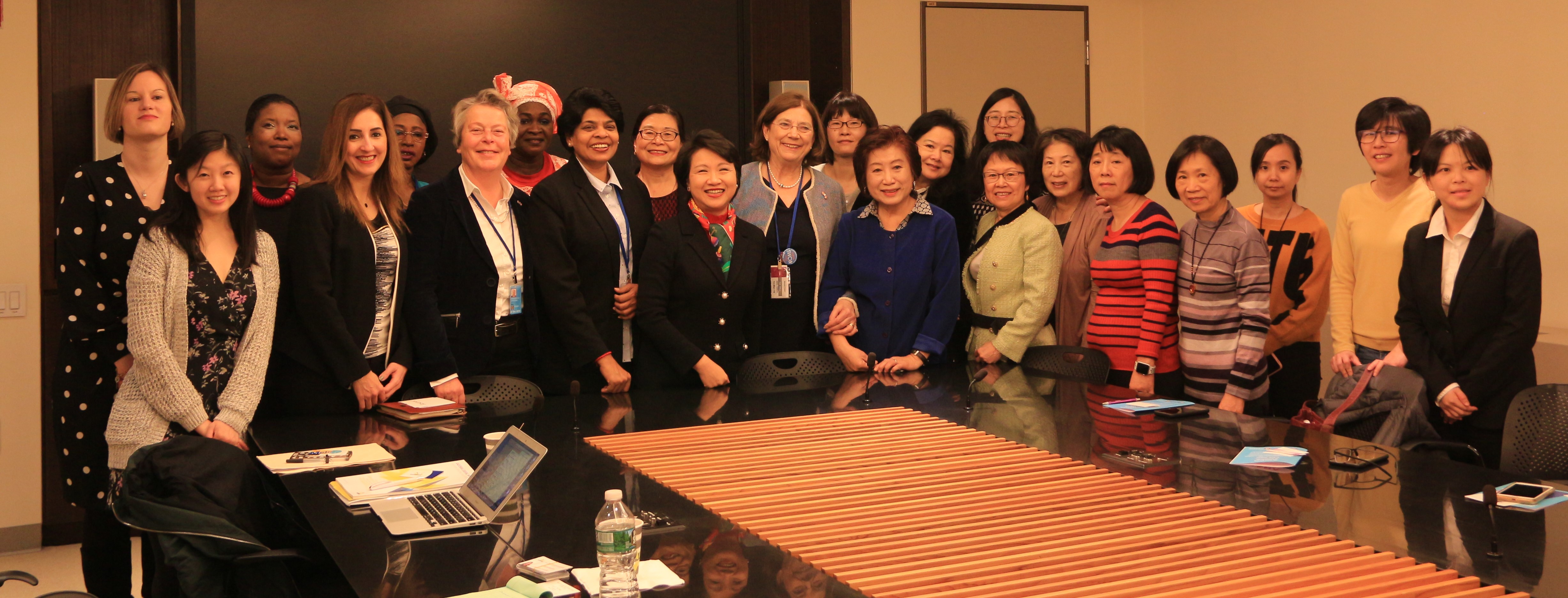
On the last day in our first week we arranged a very animated INLW meeting of INLW members with a group of ladies from Taiwan, Senegal and Mali. Many became a member of INLW.
We had our INLW side event with LI and Gender Women democracy on the Friday afternoon (seperate report).
The members of the INLW Board had a fruitfull meeting together with our new Board members and are looking forward to the next CSW march 2020.
At the closure of CSW63rd the agreed conclusions were accepted, a good result. You can download the report here.
Lysbeth van Valkenburg-Lely
Margaret de Vos van Steenwijk-Groeneveld
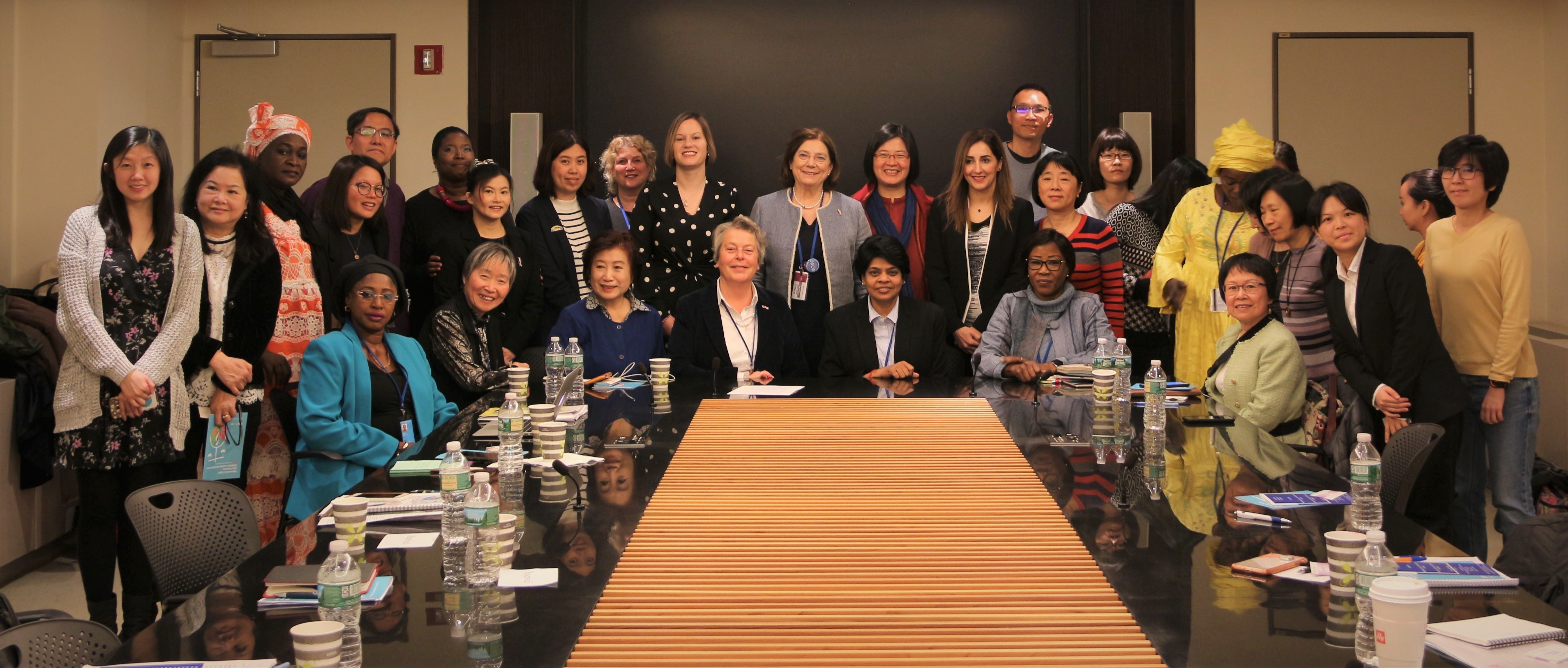
Download report
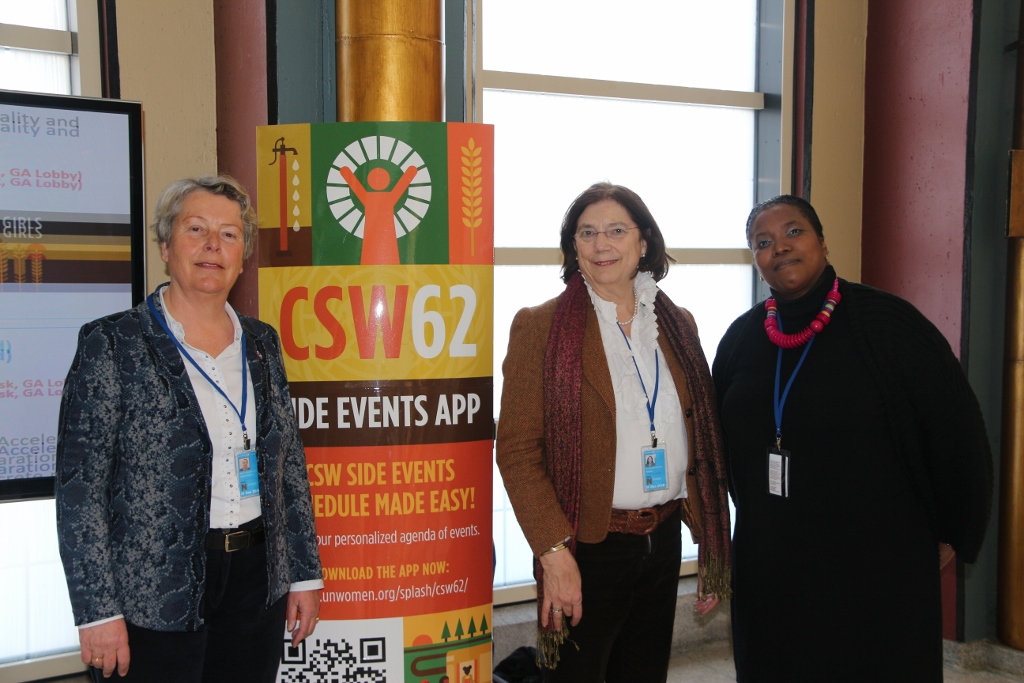 This year the UN CSW was set with the title “Challenges and opportunities in achieving gender equality and the empowerment of rural women and girls”.
This year the UN CSW was set with the title “Challenges and opportunities in achieving gender equality and the empowerment of rural women and girls”.
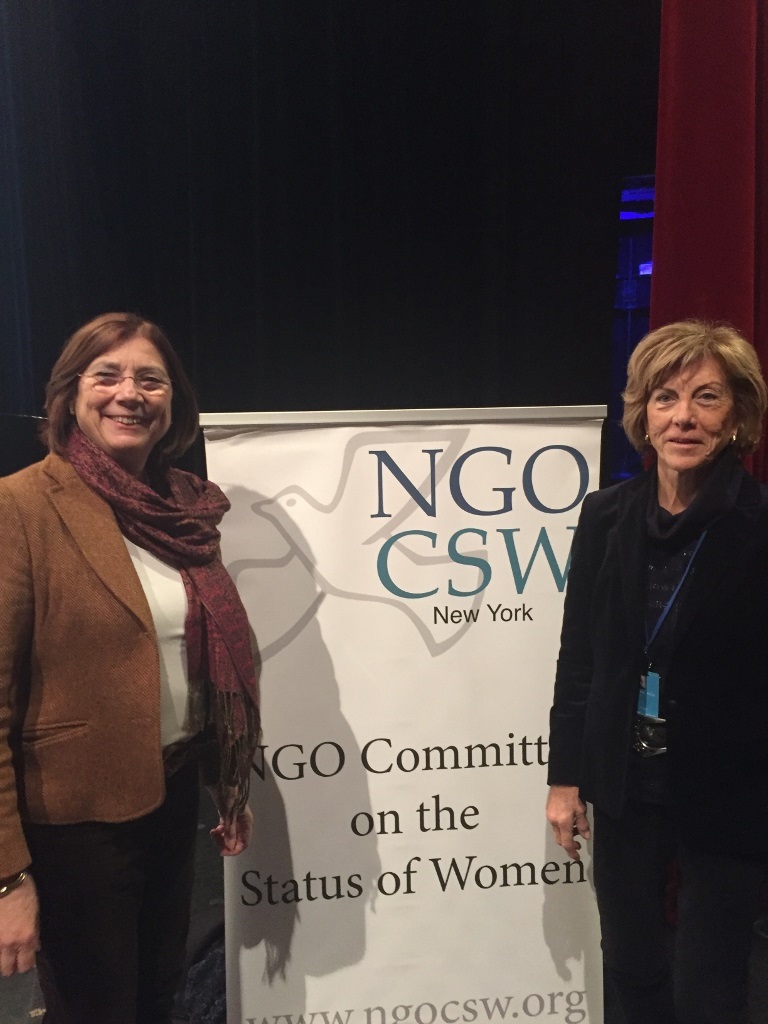 Several members of our INLW board were present. Margaret de Vos, Lysbeth van Valkenburg and Ruth Richardson were present during the opening ceremony, as well as Joaquima Alemany.
Several members of our INLW board were present. Margaret de Vos, Lysbeth van Valkenburg and Ruth Richardson were present during the opening ceremony, as well as Joaquima Alemany.
The new Chair, Ms Geraldine Byrne Nason (from Ireland) opened the 62nd CSW. She stated: “I am proud to be here in St Patrick’s week. We must promote the instruments to help girls in rural areas. I know from my own home country, Ireland, that especially women and girls can help build peace and help development in the rural parts. Girls and women must come to the decision-making table, we must leave no one behind and work on this for 2020!”. A quote from Irish Murdoch: “I think being a woman is being Irish, you are nice but second place”.
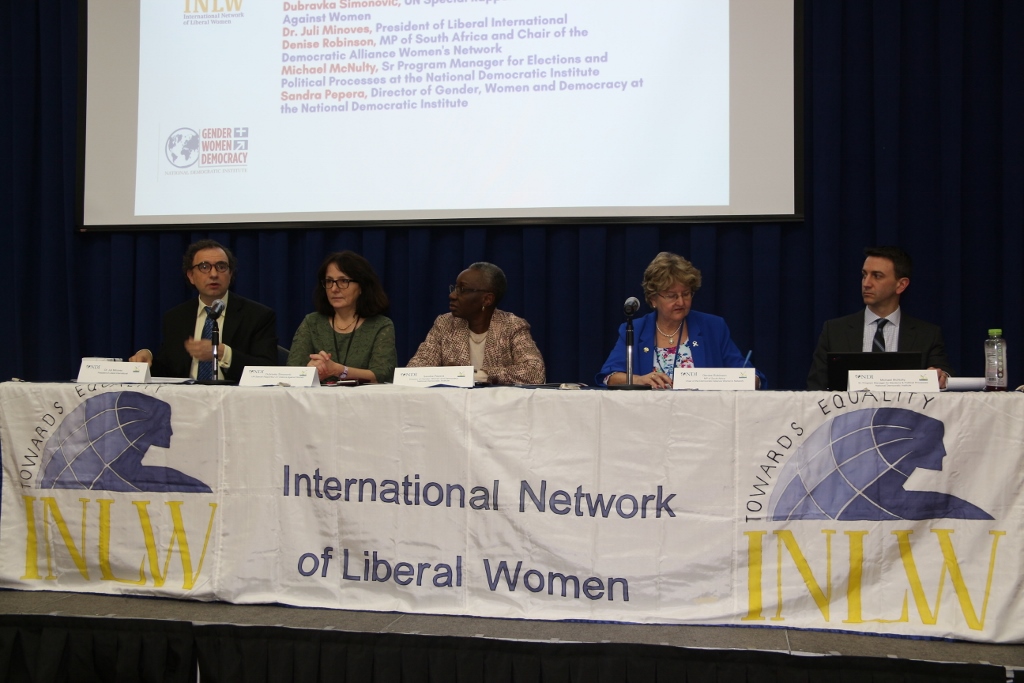 Liberal International, the National Democratic Institute and INLW organized an event about: Pushing Back, strategies for combatting violence against women in Politics.
Liberal International, the National Democratic Institute and INLW organized an event about: Pushing Back, strategies for combatting violence against women in Politics.
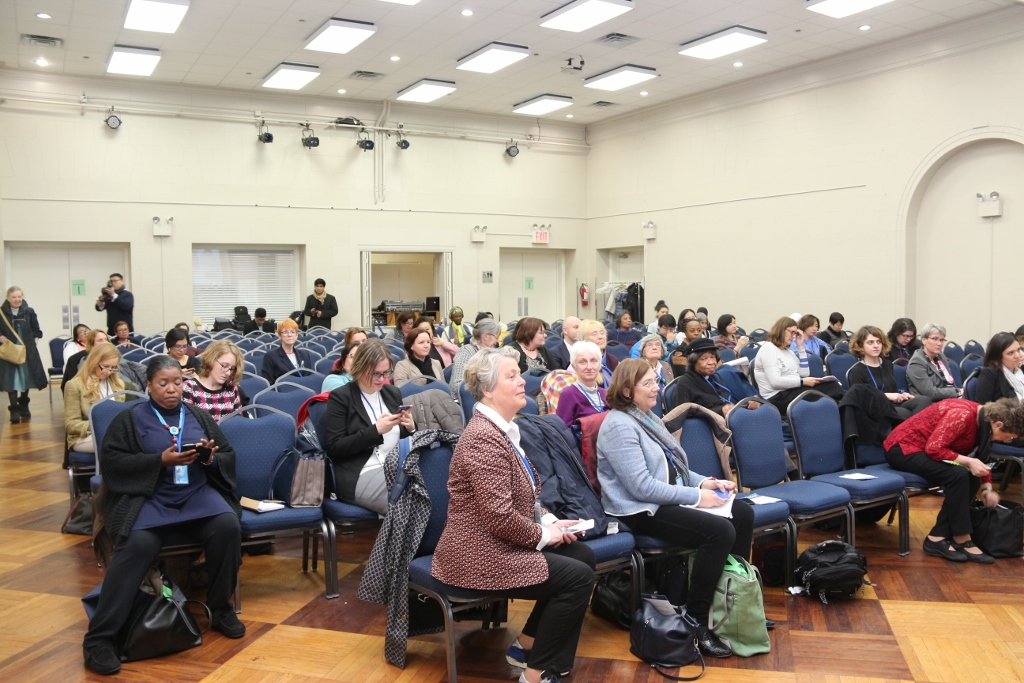 Teaming up with Madeleine Albright’s National Democratic Institute (NDI), LI and INLW asked NDI, for the occasion of two-year anniversary of the #NotTheCost campaign to end violence against women in politics, to organize a side-event on the fringes of the 62nd Session of the United Nations Commission on the Status of Women (UNCSW) in New York, raising the profile of this global cause.
Teaming up with Madeleine Albright’s National Democratic Institute (NDI), LI and INLW asked NDI, for the occasion of two-year anniversary of the #NotTheCost campaign to end violence against women in politics, to organize a side-event on the fringes of the 62nd Session of the United Nations Commission on the Status of Women (UNCSW) in New York, raising the profile of this global cause.
Under the theme Pushing Back: Strategies for Ending Violence against Women in Politics (VAW-P) and in partnership with the International Network of Liberal Women (INLW), the event aimed to showcase best practice solutions by exploring lessons learned from around the world and providing participants with tested tools to push back on violence against women in politics both preemptively and proactively.
[read more=”Read more” less=”Read less”]
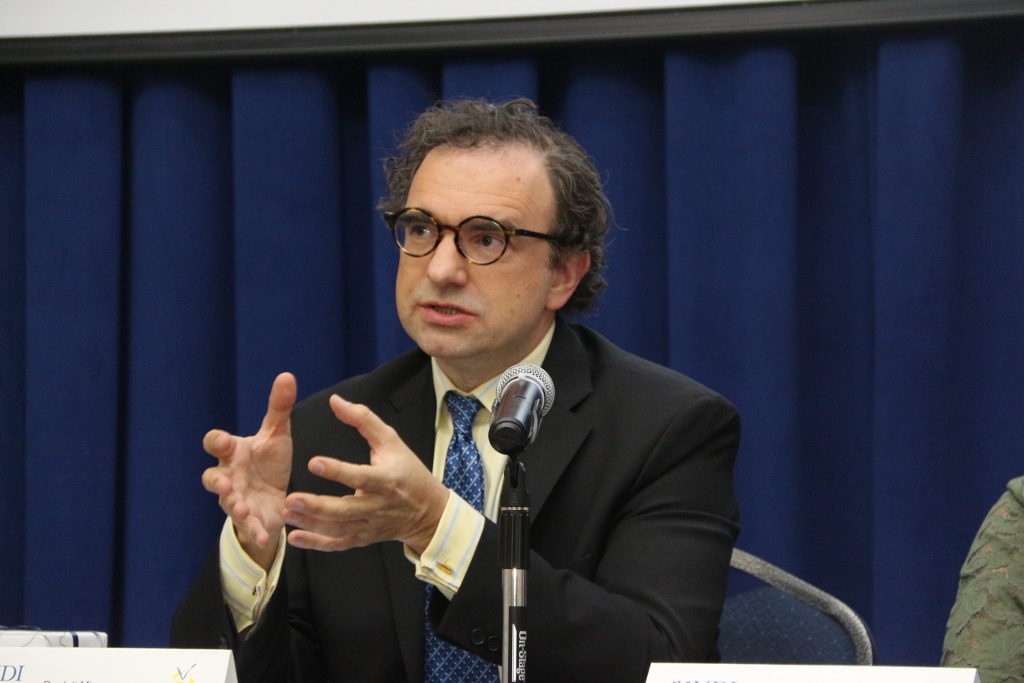 Addressing more than 100 delegates, LI President Dr Juli Minoves insisted that the abuse women in politics suffer is not only physical or sexual but psychological and liberals in government and opposition around the world are leading the efforts to offer solutions and strategies to end gender-based violence, especially violence against women in politics. “Something that happens with Violence Against Women-Politicians is that there is very little self-acknowledgement that this is happening in society and that it goes much beyond physical violence, the internet abuse is getting more and more intense” he said.
Addressing more than 100 delegates, LI President Dr Juli Minoves insisted that the abuse women in politics suffer is not only physical or sexual but psychological and liberals in government and opposition around the world are leading the efforts to offer solutions and strategies to end gender-based violence, especially violence against women in politics. “Something that happens with Violence Against Women-Politicians is that there is very little self-acknowledgement that this is happening in society and that it goes much beyond physical violence, the internet abuse is getting more and more intense” he said.
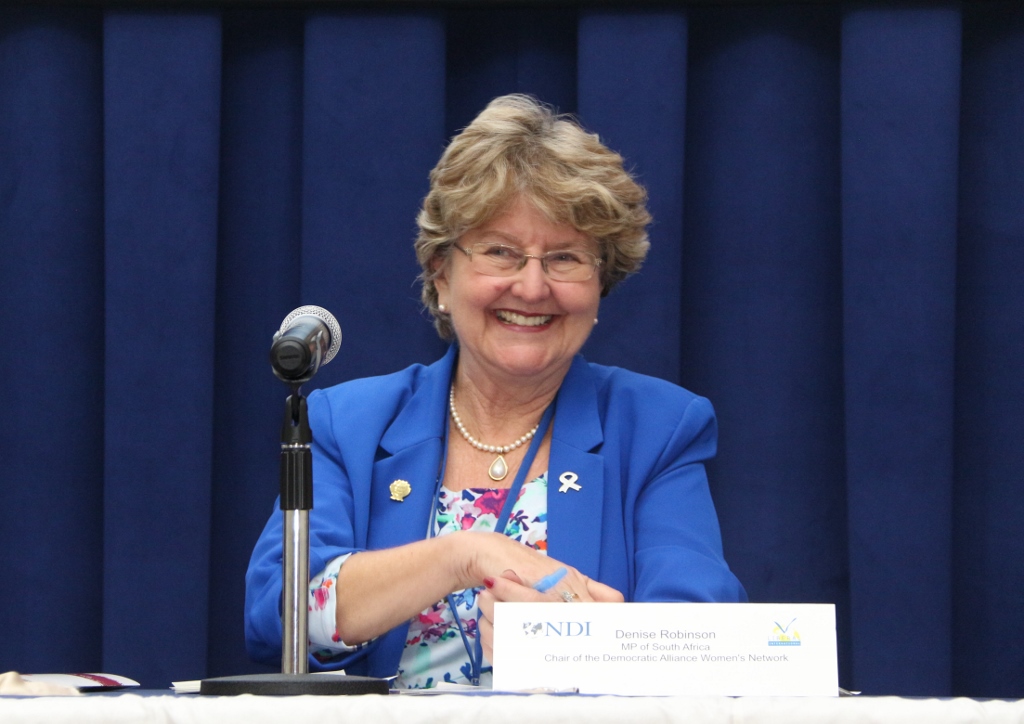 Speaking on behalf of INLW, Democratic Alliance Member of Parliament Denise Robinson, emphasized that “stronger legislation needs to go hand in hand with stronger implementation and monitoring when it comes to ending violence against women including violence against politically active women.” Even within liberal parties this attitude occurs and must be addressed.
Speaking on behalf of INLW, Democratic Alliance Member of Parliament Denise Robinson, emphasized that “stronger legislation needs to go hand in hand with stronger implementation and monitoring when it comes to ending violence against women including violence against politically active women.” Even within liberal parties this attitude occurs and must be addressed.
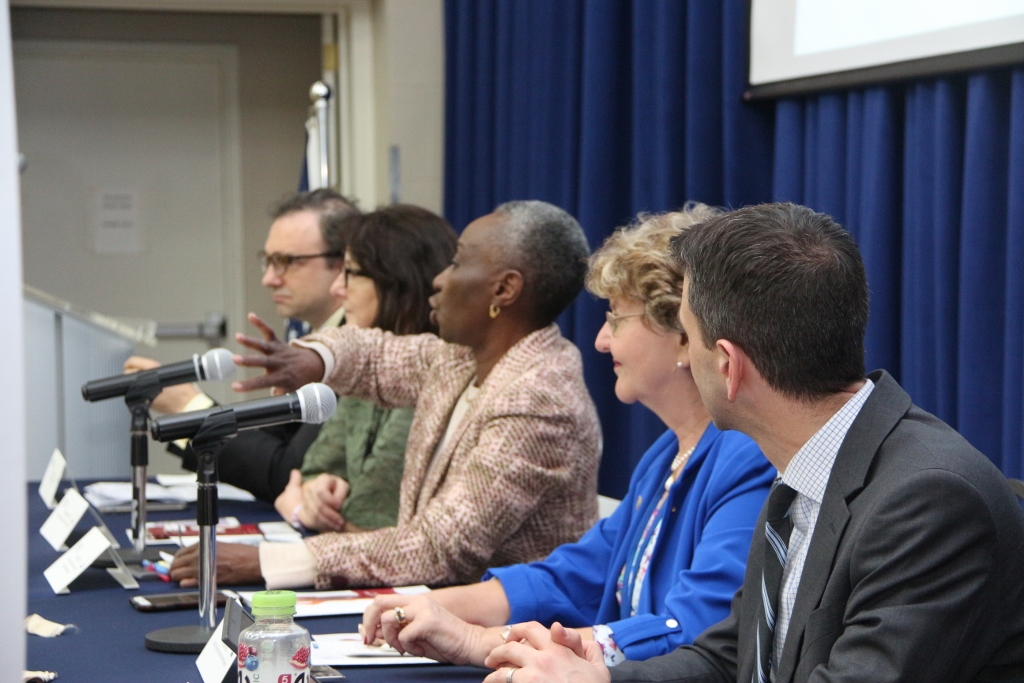 The panel was moderated by NDI’s director for Gender, Women and Democracy, Sandra Pepera and featured United Nations Special Rapporteur on Violence against Women Ms. Dubravka Šimonović, and NDI Senior Program Manager (Elections and Political Processes), Michael McNulty.
The panel was moderated by NDI’s director for Gender, Women and Democracy, Sandra Pepera and featured United Nations Special Rapporteur on Violence against Women Ms. Dubravka Šimonović, and NDI Senior Program Manager (Elections and Political Processes), Michael McNulty.
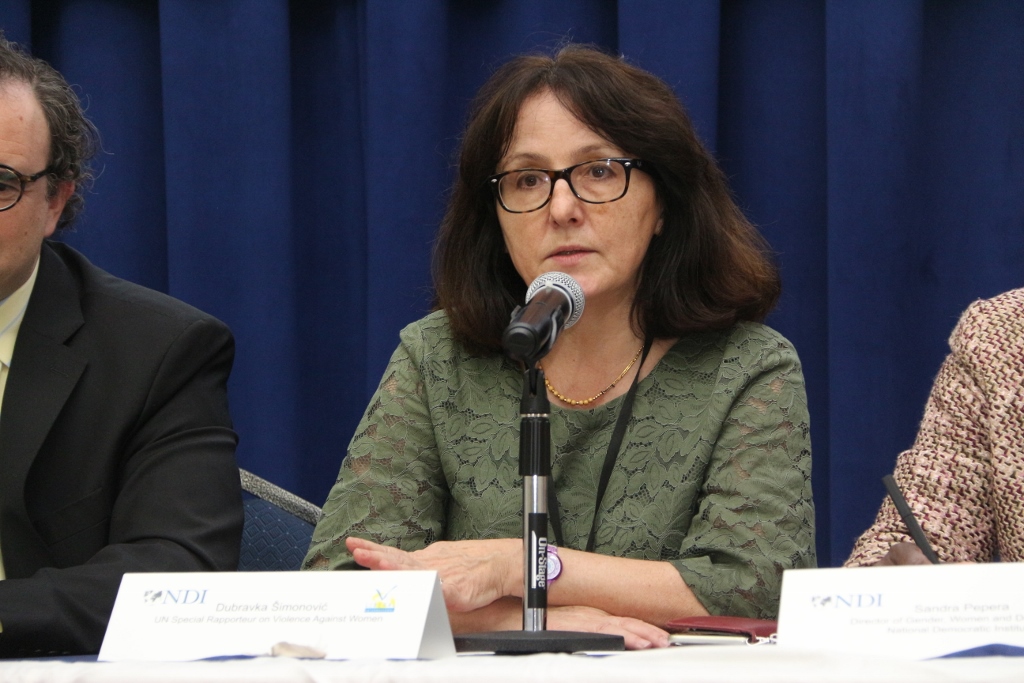 Liberal International has been at the forefront of the issue. Most recently, LI HRC Member Marina Schuster (FDP) participated in a closed expert hearing meeting with H.E. Dubravka Simonovic where she highlighted efforts of liberals in government and opposition to support women in politics and end all forms of discrimination and abuse against politically active women.
Liberal International has been at the forefront of the issue. Most recently, LI HRC Member Marina Schuster (FDP) participated in a closed expert hearing meeting with H.E. Dubravka Simonovic where she highlighted efforts of liberals in government and opposition to support women in politics and end all forms of discrimination and abuse against politically active women.
Special rapporteur Dubravka Simonovic is compiling an important report on the situation in the world concerning violence against women involved in politics. INLW is encouraging its members to file their own experiences and send this via NDI to the Special Rapporteur. This fall the report will be presented at the UN.
For information on how to file your experiences for the Rapporteur, you can contact inlw@inlw.org
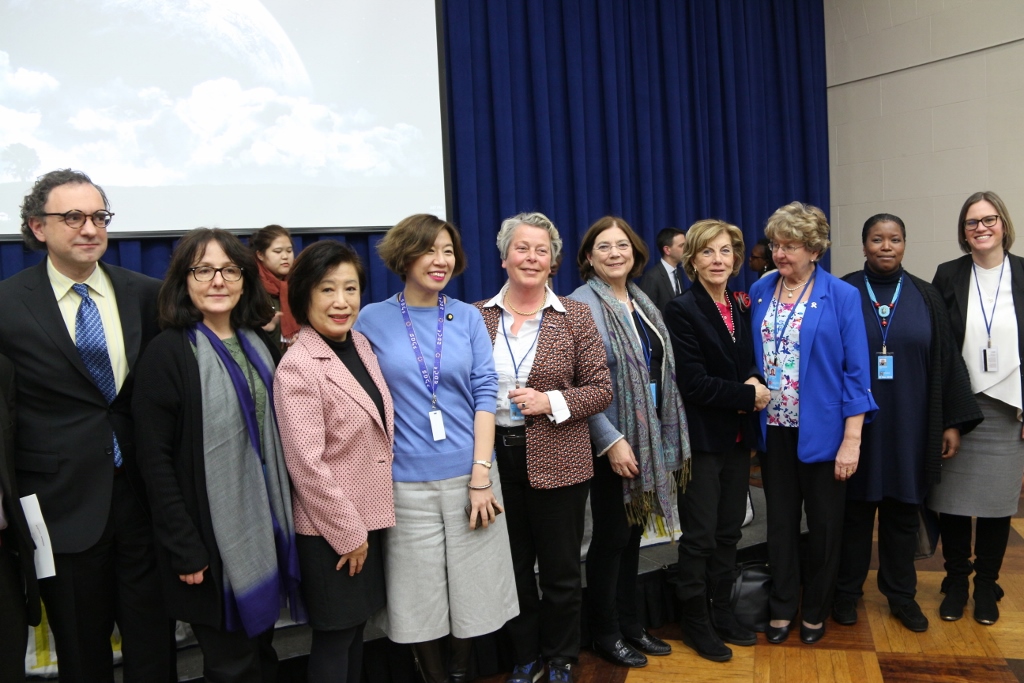
The conclusion of all the participants on the panel was, that there is still a lot of important work all around the world needed, to change the attitude towards women in politics.
[/read]
On Wednesday March 14th, 2018 at 10.30 am Margaret de Vos van Steenwijk president of INLW, was invited to deliver a speech at the Parallel Event at CSW62. This Parallel Event was sponsored by “The Urban Diversity and Mobility Research Center of Taiwan (UDM)”. She was asked to give her opinion and ideas about “Women’s political participation” in the future.
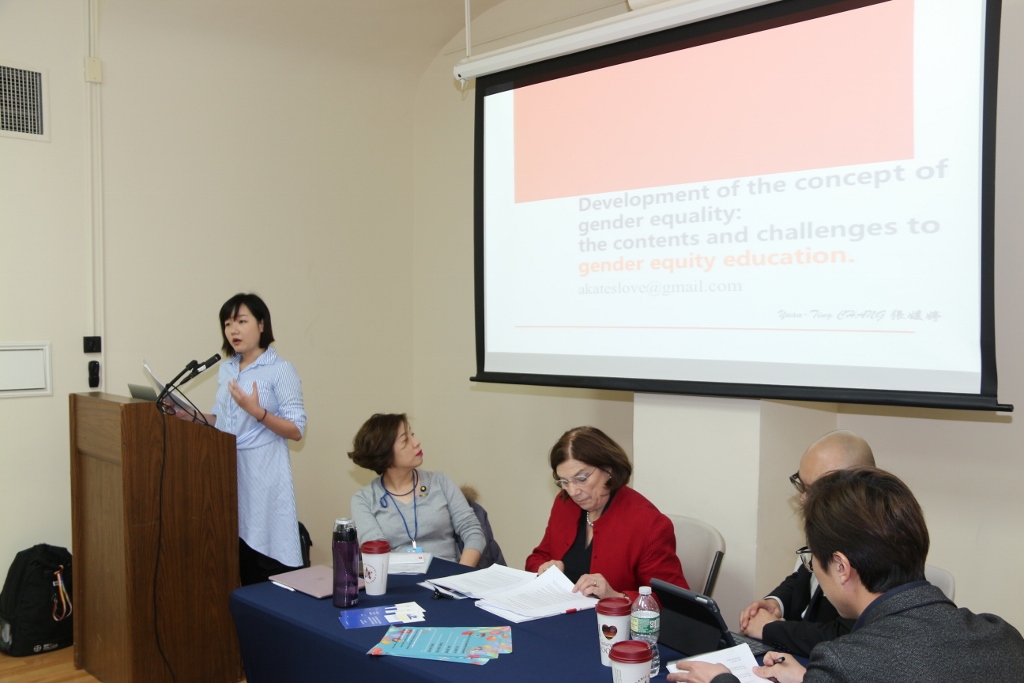 Other speakers were the Member of Parliament Mrs. Lin Ching-Yi who spoke of the situation in Taiwan for women. Also, Mr Shih, Mu-Min Ph.D. candidate University of Department of Asian Studies, Texas at Austin spoke of the gender progressiveness but very much with the eyes on the past. Gender is a word that does not exist in Taiwanese and so very often sex is put in its place which has a different meaning that is often overlooked in the policy papers and and discussions.
Other speakers were the Member of Parliament Mrs. Lin Ching-Yi who spoke of the situation in Taiwan for women. Also, Mr Shih, Mu-Min Ph.D. candidate University of Department of Asian Studies, Texas at Austin spoke of the gender progressiveness but very much with the eyes on the past. Gender is a word that does not exist in Taiwanese and so very often sex is put in its place which has a different meaning that is often overlooked in the policy papers and and discussions.
“How women make Cities smarter? Education, Empowerment and Policies. Through the improvement of education and more political participation of women we can see a change. Now there are 38% women in parliaments all over the world. Locally we find even more women in city councils and as aldermen. The females are more supportive of points such as gender equality and the endorsement of it. The gender equality is now integrated in the curriculum of health and physical education. Many school text books must be changed so that the existing gender stereotyping is taken out. They should for instance be illustrated in a gender equality friendly fashion.
[read more=”Read more” less=”Read less”]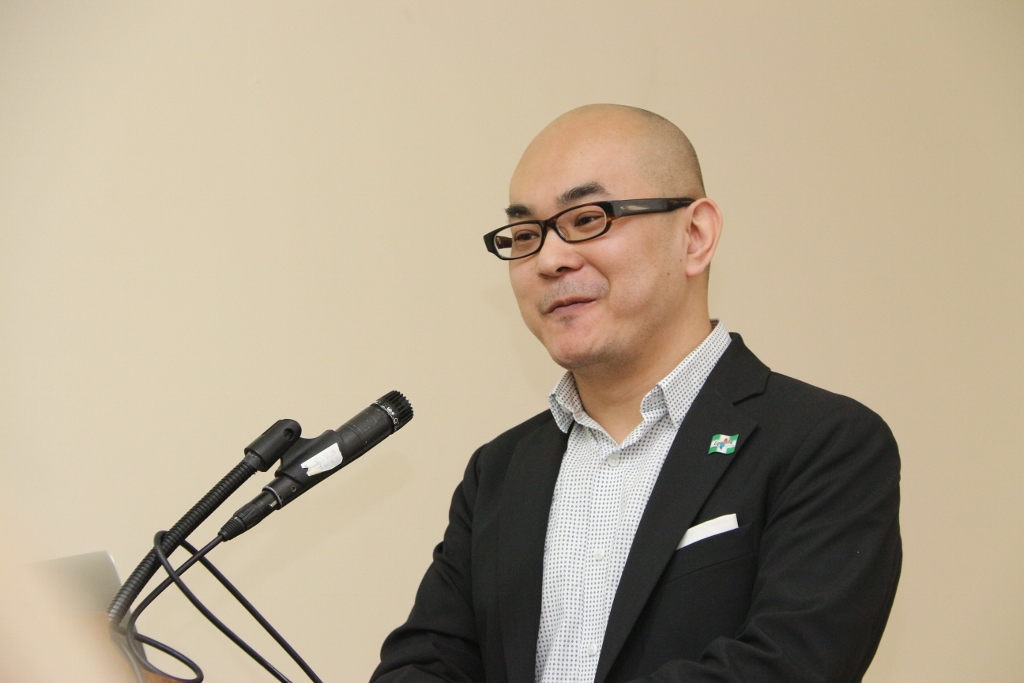
Mrs Chang, Yuan-Ting, Alternate Director, Urban Diversity and Mobility Research Center and Mr Chen, Chih-Wei who resides in London from the UN Sustainable Development Goals Advisory Council of Taiwan also spoke briefly. He was emphasizing connecting people and stressed the importance of conversation between men and women.
In Taiwan although many girls do get educated there is still the notion of Motherhood which prevails, and which monopolizes Femininity. 1988 the Gender equality was introduced in education.
Confucianism is still in the minds of Taiwanese people whereby women should be mothers and should not give that task to immigrant women. There is a prejudice towards immigrant women.
Margaret de Vos spoke of the importance of empowering women to participate in politics and economy. Without their participation we can’t build a sustainable world and sustainable cities. More than half the population in every country is female. It is important to use this latent working force and intellect. She gave answers to questions such as `What reasons are there to empower women to take part. What do you miss if they don’t participate`.
First, no person may be excluded the right to represent the people. Socially inclined reasons for diversity in political bodies are that the people should recognize themselves in those representing them in democratic bodies. It is not only important to have men and women, but also for instance ethnical diversity is important, so that people FEEL they are represented.
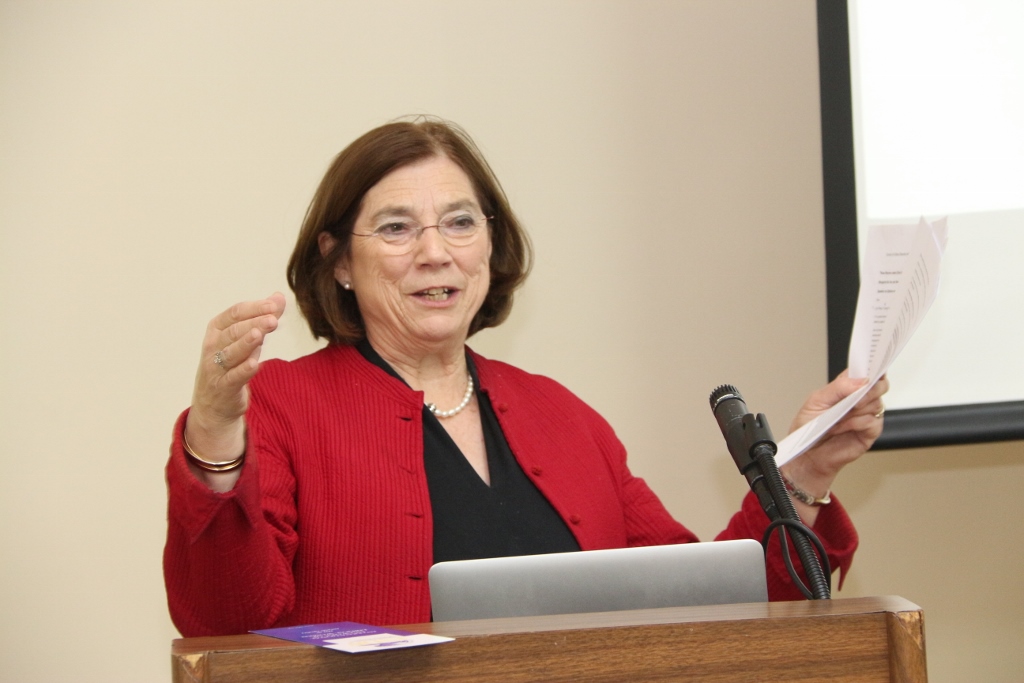 Second a more diverse parliament or government will address more of the concerns that apply especially to women. Diversely composed town councils and parliaments also know better what is going on in society. And likewise, the political agenda will reflect the questions which civil society finds important. SO, it often takes women to bring changes into legislation in favor of women and society. Political representation by women is also important to get rid of obstacles there are to get women elected. Also, for the knowledge they bring along in relation to themes which concern especially women or related to emancipation themes. Changes are necessary, but this means that if you want changes made you better change those who take the decisions as well. There is a critical mass needed to be able to make a difference and a change and that is 30 %.
Second a more diverse parliament or government will address more of the concerns that apply especially to women. Diversely composed town councils and parliaments also know better what is going on in society. And likewise, the political agenda will reflect the questions which civil society finds important. SO, it often takes women to bring changes into legislation in favor of women and society. Political representation by women is also important to get rid of obstacles there are to get women elected. Also, for the knowledge they bring along in relation to themes which concern especially women or related to emancipation themes. Changes are necessary, but this means that if you want changes made you better change those who take the decisions as well. There is a critical mass needed to be able to make a difference and a change and that is 30 %.
Mrs. De Vos also raised the question if political parties do better if they have women on the ballot list. She called upon this to be researched.
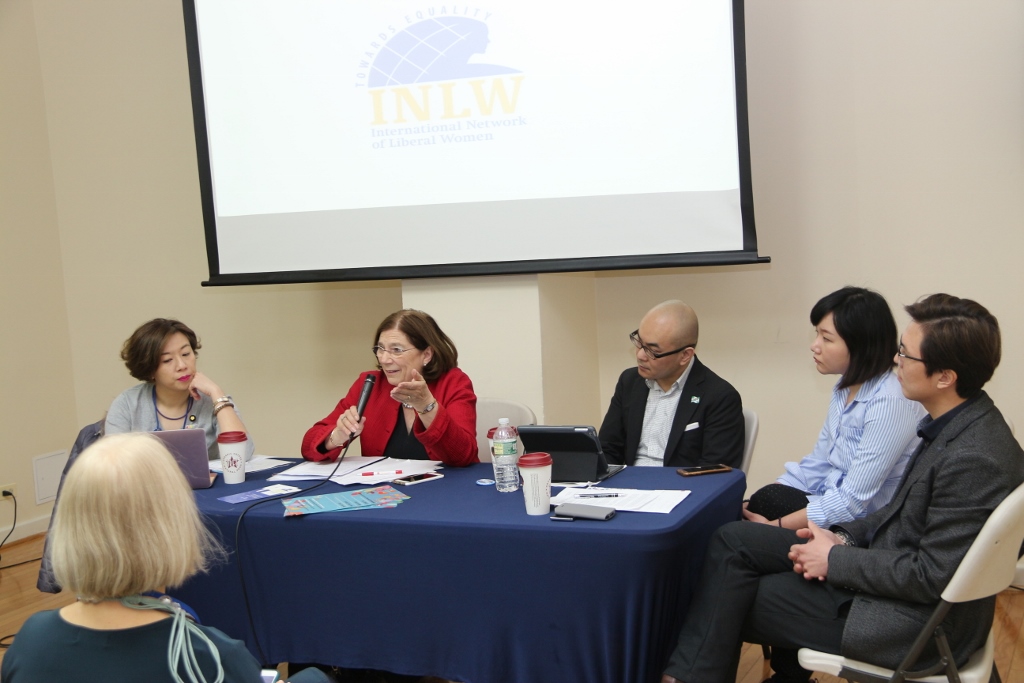 Have more working women changed cities? Active women in cities has changed the way of life in many cities. Just look at the burst of new restaurants in towns, where couples eat out very much more than in the past where the women were always at home preparing and cooking the meals. Empowerment of women and diversity in decision making is important to use all available talent.
Have more working women changed cities? Active women in cities has changed the way of life in many cities. Just look at the burst of new restaurants in towns, where couples eat out very much more than in the past where the women were always at home preparing and cooking the meals. Empowerment of women and diversity in decision making is important to use all available talent.
Albert Einstein: “The significant problems we face today cannot be solved by the same level of thinking that created them”. She mentioned that the brain architecture of men and women is different: Women think in web style and men in step thinking. Women considering more options to a problem and men, in general of course, thinking more via a linear causal path. Other positive traits can be intuition, mental flexibility, long term planning, creativity and keen imagination as well as other views on power. Working towards better decisions, while showing more patience, more listening qualities and showing more empathy, women tend to show a different kind of leadership. With all these positive reasons why are Women still not so empowered?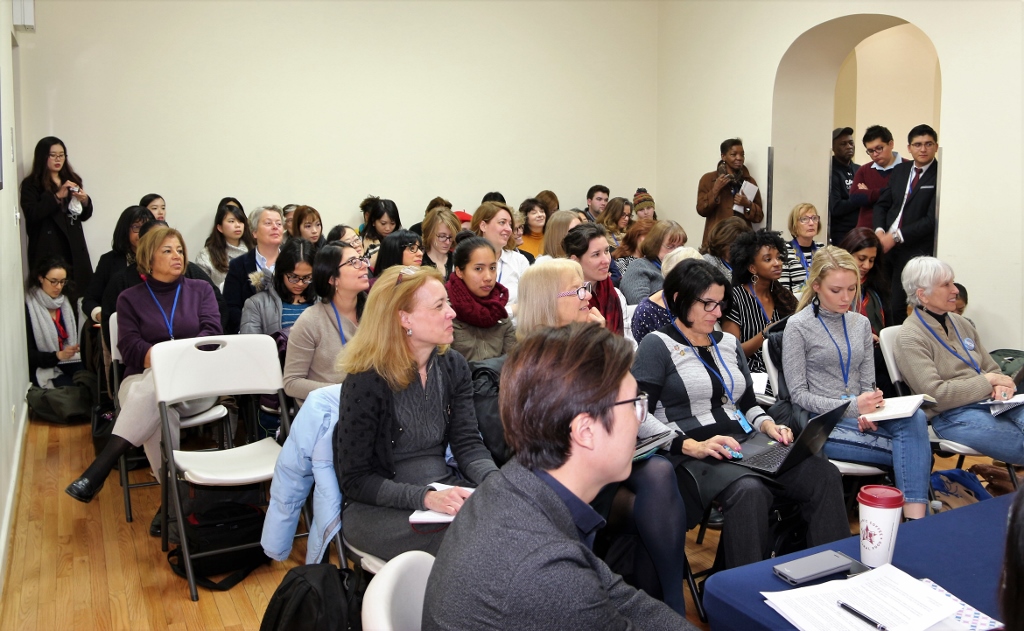
Mrs. De Vos went on to explain that women often wait to be asked or are triggered only after being encouraged. There is a social, political and practical necessity to have women on board in representative bodies like Town Councils and Parliament. How to get more women there? Get them over their modesty, teach them to present themselves with more confidence, while learning to exaggerate a little at least. Build up a network and within political parties learn to ignore any biased comments and use the competitive atmosphere for your own good.
Get to share the tasks in the household with the partner to be able to take on the extra work. And make sure you get women and especially also men to promote your candidacy. Go for it with a personal campaign. Think as party that 50% of the voters are women. So, widen the campaign with slogans and media presentation on subjects that appeal to women and present good solutions for these topics. Parties must give exposure to the women candidates! With the female vote one can win 50% of the voters! In Mrs. De Vos ’s experience in the Netherlands there are many women who only vote for women. So, you better have women on your lists!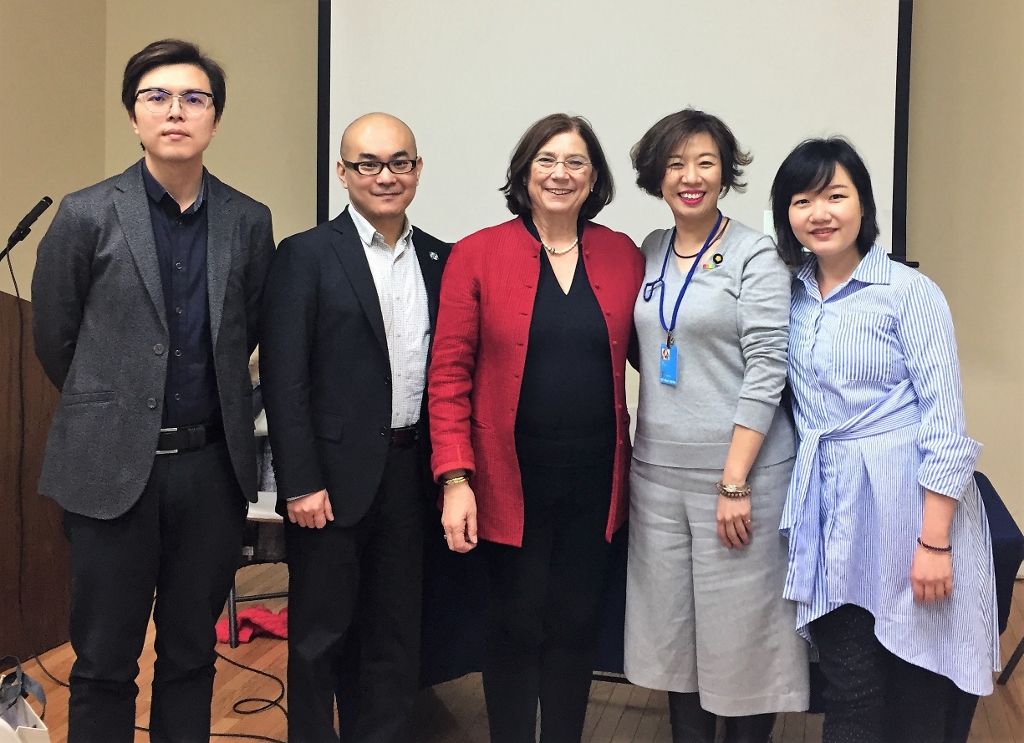
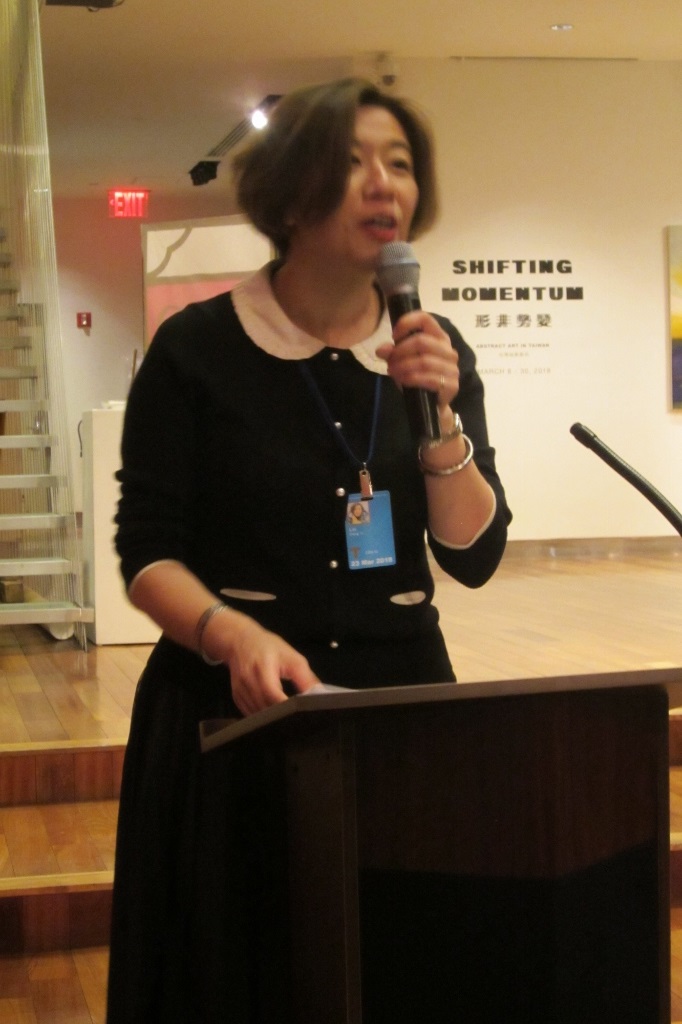 She concluded: “We must use all capacities, talents, creativity and knowledge of half of the population. Women then become more engaged in public decision making and it is a means of ensuring better accountability to women and making more and better decisions which will be beneficial for the country and towns! Diversity and empowerment of women is a question of common sense! The message is that Democracy without women is incomplete. Women’s adequate political participation is a fundamental prerequisite for gender equality and genuine democracy. Without the representation of women there is no Democracy”. Before the time was up a few questions were able to be asked, resulting is a discussion on whether women should help each other more instead of sometimes showing actions of jealousy and where Margaret found her information. The answer was: yes women should be more supportive of each other and promote each other more!
She concluded: “We must use all capacities, talents, creativity and knowledge of half of the population. Women then become more engaged in public decision making and it is a means of ensuring better accountability to women and making more and better decisions which will be beneficial for the country and towns! Diversity and empowerment of women is a question of common sense! The message is that Democracy without women is incomplete. Women’s adequate political participation is a fundamental prerequisite for gender equality and genuine democracy. Without the representation of women there is no Democracy”. Before the time was up a few questions were able to be asked, resulting is a discussion on whether women should help each other more instead of sometimes showing actions of jealousy and where Margaret found her information. The answer was: yes women should be more supportive of each other and promote each other more!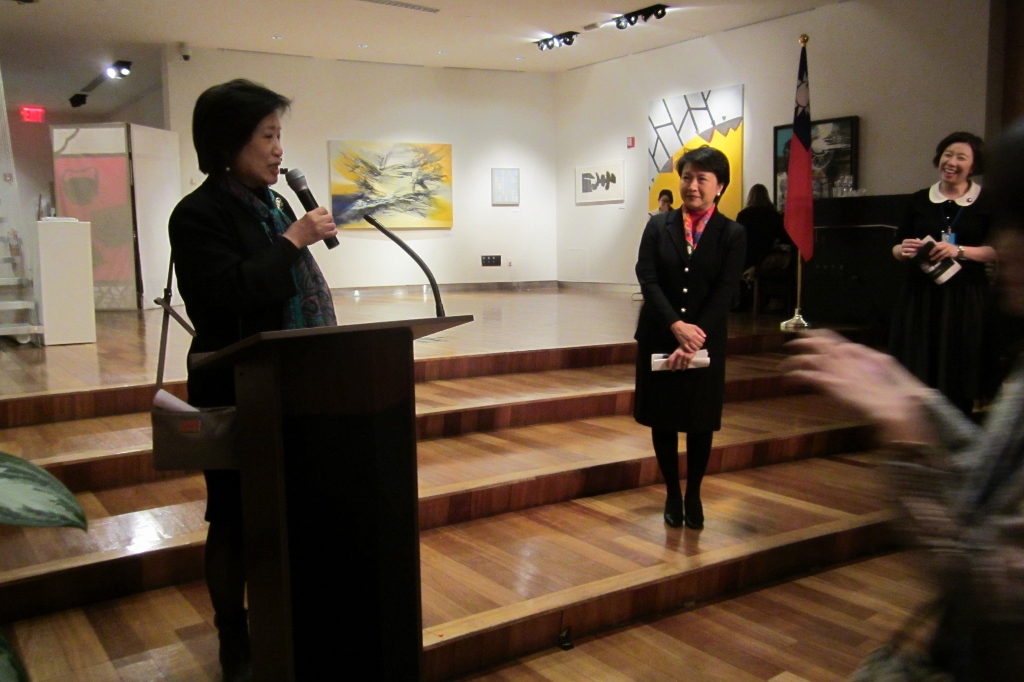
The next day the members of the Board of INLW were invited to the Taiwan building. Here our Board member Maysing Yang was one of the speakers during the evening.
[/read]
Parallel Event 17th March 2017
The INLW Board was represented at the CSW by Khadija El Morabit (Vice President for MENA region), Maysing Yang, (Vice President for Asia), Lysbeth van Valkenburg (Treasurer), Margaret de Vos van Steenwijk (President) and, Leticia Gutíerrez (Member of the Board) and also by INLW member Petra Rona. Joaquima Alemany (Past President) was also present representing Dones Libertatt et Democratia as Chairman.
 Unfortunately, because of the winter storm In New York, all programs were cancelled on Tuesday 14th. Luckily for us our parallel event was rescheduled on Friday 17th in the morning.
Unfortunately, because of the winter storm In New York, all programs were cancelled on Tuesday 14th. Luckily for us our parallel event was rescheduled on Friday 17th in the morning.
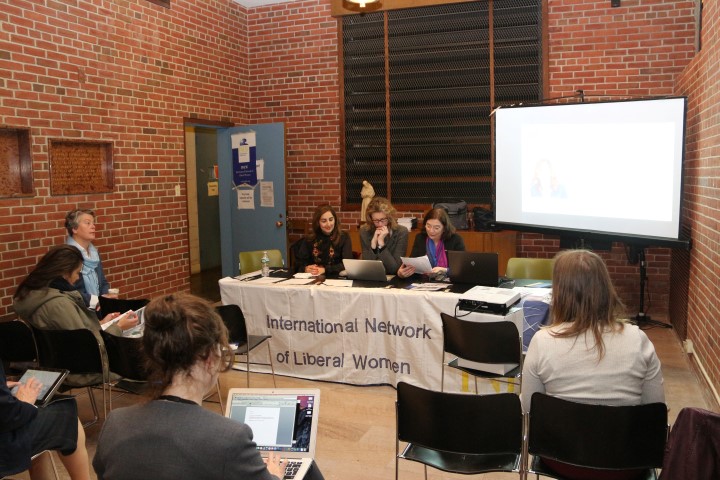 The main theme of CSW “Women’s economic Empowerment in the Changing World of Work” was lead in our choice for the event focusing on:
The main theme of CSW “Women’s economic Empowerment in the Changing World of Work” was lead in our choice for the event focusing on:
“Overcoming Challenges facing women in Business in this changing world”.
The objective was to provide an insight into the situation of women starting up business as well as running a business and their possibilities for economic empowerment around the world in these changing times.
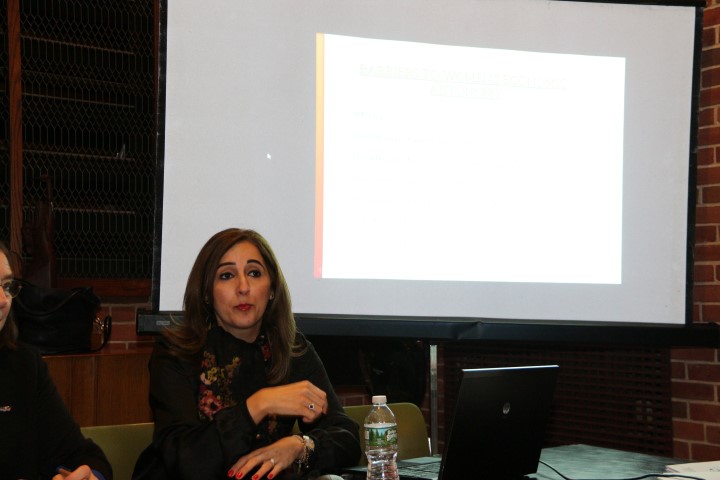 Khadija El Morabit (Entrepreneur and General Manager of a hotel business) gave her experience of starting any business as an independent woman in her home country of Morocco. For many years, it was very problematic to start any business as a woman. The reasons are the lack of women’s economic autonomy, due to illiteracy, low level of wages and income; unequal sharing of domestic chores; lack of places of child care and the high prices; lack of access to decision-making power related to the economy and lack of access to resources and means of production. But fortunately, the possibilities are better today. Feminine entrepreneurship is recognized now as source of growth, job creation, innovation and wealth in Morocco. Still the lack of publicity about public institutions that help and support entrepreneurship for women and the fact that many businesses make a start via an entrepreneurship, where business is integrated in a parental company and the fact that women do not inherit the family business is a great disadvantage for women entrepreneurs and poses a problem for specific support programs dedicated to these women entrepreneurs who want to start their own business.
Khadija El Morabit (Entrepreneur and General Manager of a hotel business) gave her experience of starting any business as an independent woman in her home country of Morocco. For many years, it was very problematic to start any business as a woman. The reasons are the lack of women’s economic autonomy, due to illiteracy, low level of wages and income; unequal sharing of domestic chores; lack of places of child care and the high prices; lack of access to decision-making power related to the economy and lack of access to resources and means of production. But fortunately, the possibilities are better today. Feminine entrepreneurship is recognized now as source of growth, job creation, innovation and wealth in Morocco. Still the lack of publicity about public institutions that help and support entrepreneurship for women and the fact that many businesses make a start via an entrepreneurship, where business is integrated in a parental company and the fact that women do not inherit the family business is a great disadvantage for women entrepreneurs and poses a problem for specific support programs dedicated to these women entrepreneurs who want to start their own business.
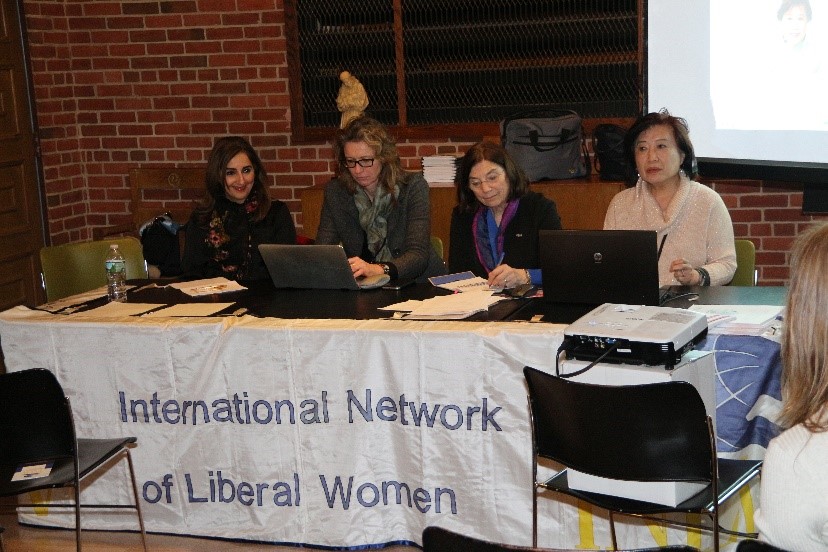 Our Member from Asia (Taiwan), Maysing Yang (Vice President for Asia), gave her view of possibilities in her region. When she started her own business, she had to have a man as president without his signature she could not start a business so she started as a vice-president in her own company to get started. It takes many years to start a business, certainly if you don’t want to bribe any people to start. The education for girls is getting better so in the future opportunities will improve but men get jobs more easily than women. In any question of heritage in Asia the eldest son inherits the assets. That is going to be changed but the culture is not so easily changed so it will take many years to get this working.
Our Member from Asia (Taiwan), Maysing Yang (Vice President for Asia), gave her view of possibilities in her region. When she started her own business, she had to have a man as president without his signature she could not start a business so she started as a vice-president in her own company to get started. It takes many years to start a business, certainly if you don’t want to bribe any people to start. The education for girls is getting better so in the future opportunities will improve but men get jobs more easily than women. In any question of heritage in Asia the eldest son inherits the assets. That is going to be changed but the culture is not so easily changed so it will take many years to get this working.
The government is investing in women and recently a law has been adopted to assist start-ups.
One of the things women must do more, is investing in their network! The men meet each other for instance after work and build their network, through this male network many jobs are given to men. Women often underestimate the importance of mingling with other women and men.In the new age, you can see that young people try to find each other via on-line communities. Investing in ICT and knowledge of all its possibilities is very important for the future.
Our Speaker from the Netherlands, Jaqueline Prins, had already left after the winter storm for her job in the Netherlands.
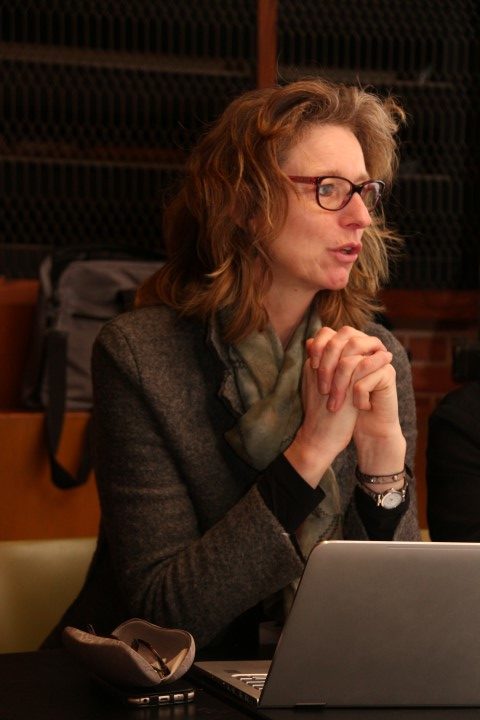 We were happy to welcome Antia Wiersma, deputy Director Atria – Netherlands Institute for Gender Equality and Women’s History.
We were happy to welcome Antia Wiersma, deputy Director Atria – Netherlands Institute for Gender Equality and Women’s History.
Antia Wiersma gave us some insight in the women empowerment in the Netherlands. There are still many women working part time (75% of women compared to 22% of men). Unfortunately, this also means that only 54 % of the working women are economically independent and many women work in the less paid jobs and are paid less. World Wide, women only make 77 cents for every dollar earned by men. This also influences the gender pay gap which amounts to 22%. Young women start out earning more being highly educated, but by age 30 they earn less than men.
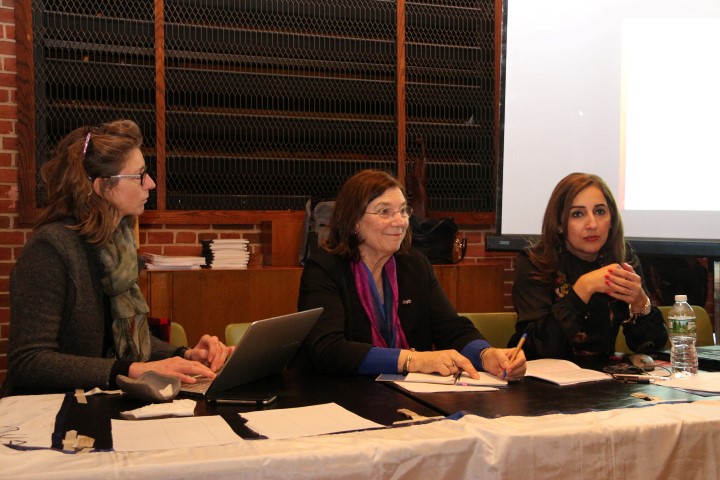 In the Dutch parliament 36 % of the parliamentarians are women. On the Dutch TV 1 in 3 persons in the talk shows are women and only 12 % of the experts that are asked to participate are women. So, although many things are well arranged for women there are still quite some things to improve.
In the Dutch parliament 36 % of the parliamentarians are women. On the Dutch TV 1 in 3 persons in the talk shows are women and only 12 % of the experts that are asked to participate are women. So, although many things are well arranged for women there are still quite some things to improve.
One of the discussions in the Netherlands is about maternity leave and if a quota about the number of women working in decision-making positions in companies and the government is a clever idea.
“We have to educate the girls about the importance of economic empowerment and independence”. Mrs. Wiersma told that “by pushing the women into the working market and implementing equal pay for men and women we can really make progress for our young girls”. We want to achieve gender equality by 2030 (Planet 50/50 by 2030). We must all recognize the gender gap in work and employment and create a cohesive action-orientated plan. A plan that challenges individuals as well as the public and private sector.
“A black list of companies who are not paying equal might work, as in Switzerland”. Companies are not allowed to work for the government if they don’t show their intentions to really pay equal and have enough women in the top.
Mrs. Wiersma is convinced that if the Netherlands doesn’t take more action it will not be able to reach the 50/50 in 2030 deadline that has been agreed upon worldwide.
As what to do for the future: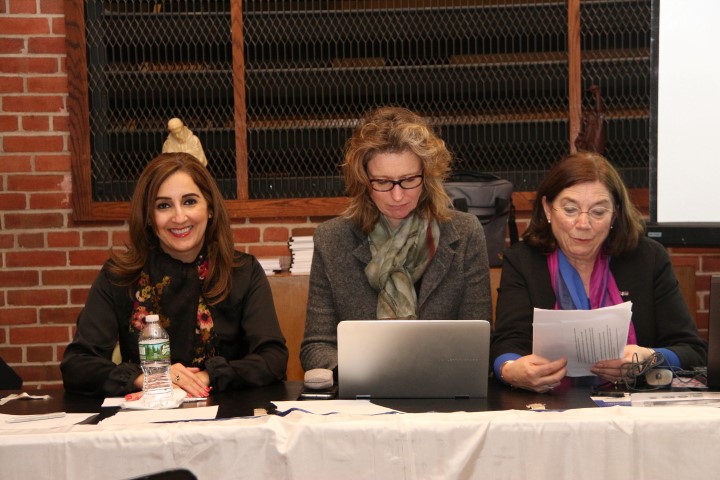
It is clear there are too few women in the so-called STEM (Science, Technology, Engineering and Mathematics) and ICT jobs. That world is still a men’s world and this must change as this is where the new jobs in the changing world will be!
In the changing world of the 4th revolution 1 in 4 women will lose their job while 1 in 20 men will lose their job. That is a challenge which must be worked on for instance by lifelong learning.
The interesting discussion between the group attending the event and the panelists gave some conclusions.
Even more insight is needed in the battle to reach the 50/50 goal.
Some of the young participants also pointed out the importance of ICT and reliable data collecting to get an insight of the results of some measures that are taken by countries all over the world. By reliable data you can enlighten the political parties so that necessary measures can be taken.
They also mentioned young women in Asia often prefer marriage to seeking jobs.
More access to finance is needed, whereby barriers of laws and rules concerning ownership of property and land; inheritance; loans only with guarantees and higher interest rates must be taken away.
Putting an effort to getting a good network is important in any business for men and women. Women must learn to make use of it and keep it up.
Moderator, Mrs. de Vos van Steenwijk, finally thanked all participants for their information and interesting discussion.
Lysbeth van Valkenburg-Lely
Margaret de Vos van Steenwijk-Groeneveld
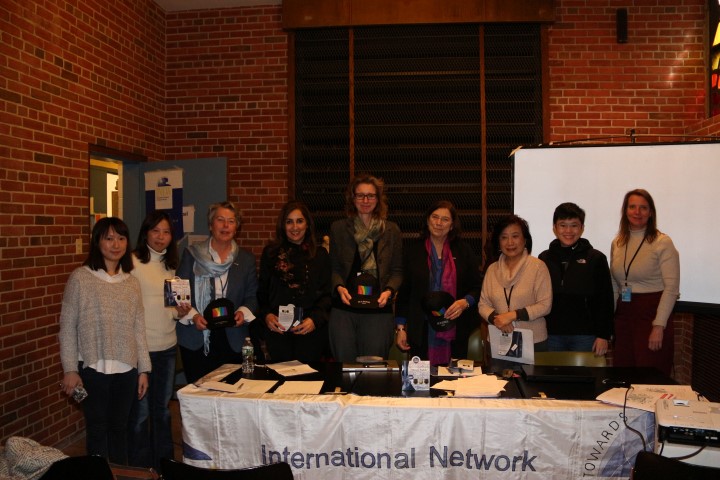
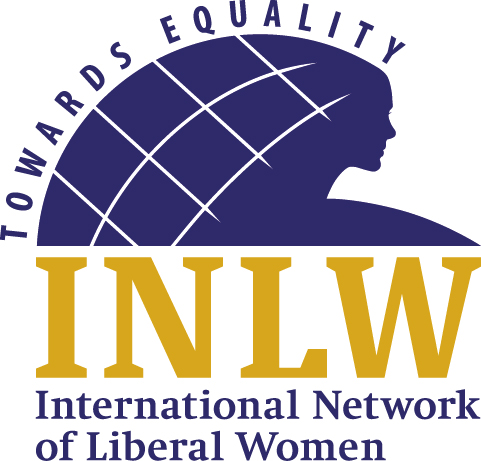
 Visit our Facebook page
Visit our Facebook page